#including depression not knowing what do with your life unemployment and all
Text
tuesday again 3/19/2024
boy hope i never run out of zelda games to play or my mental health is going to Tank. there are very vague endgame stuff spoilers (not where zelda is, but some of the time fuckery) but i am going to spoil a bit of the rito sage quest. nothing is rot-13'ed. i feel like that's a fair compromise since this game has been out for about a year? please let me know YOUR opinions on recent game spoilers
listening
Thanks A Lot But No Thanks from the 1955 musical It's Always Fair Weather, sung by Dolores Grey. this was Dolores Grey propaganda in the @hotvintagepoll. i love a sugar baby song and this is sort of an. anti-sugar-baby song? a satitrical sugar baby song? she thanks suitors for increasingly improbable gifts (the state of Maine, et al) before killing them??
the PIPES on this woman!!! the comedic timing!!! she pulls out a gun and shoots suitors dead while thanking them for an autographed picture of john wayne!!! she pulls a big lever and they all fall under the stage!!! ive been having kind of a Time in the depths of unemployment and this made me genuinely laugh (not one short sharp bark of laughter, full on cackling).
youtube
thanks for the darling uranium mine indeed
reading
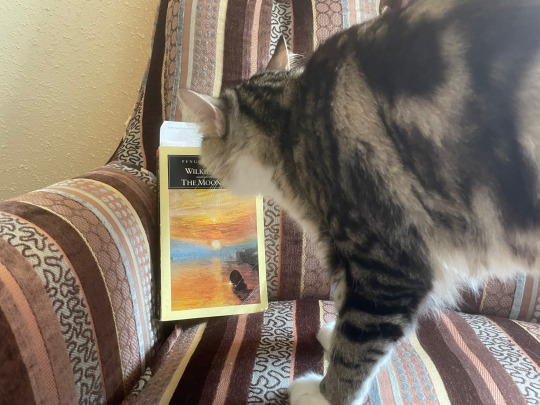
the moonstone by wilkie collins (and philip). this has been my falling asleep reading book. this is decidedly not a cozy mystery but the stakes are not like. so high i have to keep reading through the night to find out what happens. i'm having a good time with it, currently about halfway and still very irritated with rachel, the main character right now. i have not revised my "spoiled brat" opinion and i look forward to seeing if i ever revise it.
-
watching
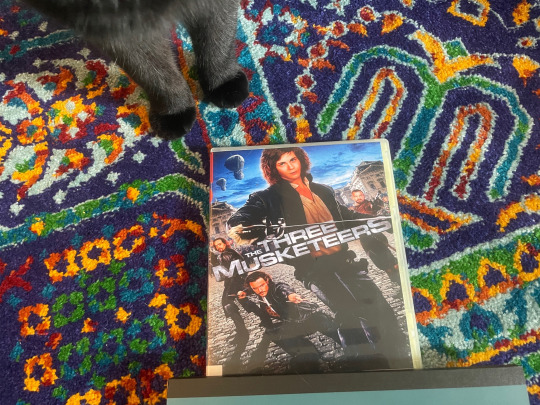
The Three Musketeers (2011, dir. Paul W.S. Anderson). thank you mackintosh (this is a discard from my hometown library and no one needs to know where that is thanks). it's pretty widely available on free platforms rn which is how you know it's good. it's not Good is the thing but it is extremely fun. it is straight up the three musketeers but with an airship. milla jovovich jumps off an airship into the channel. milla jovovich does some assassins creed shit. luke evans does some assassins creed shit. there is an airship fight and an airship chase. it is So cheesy and unfortunately never got another sequel. it also inexplicably has some of the finest cinematic swordfighting since the golden age of hollywood.

this was a really successful impromptu movie night pick for a more widely varied gang than usual, including some teens. my bestie also enjoyed it, which i am So pleased by bc she has extremely exacting movie taste. this cast is so stacked for no good reason: orlando bloom, luke evans, christoph waltz, mads mikkelsen, matthew macfayden...
-
playing
i have a post in my head about breath of the wild and tears of the kingdom and their dialogue with each other about loss and grief, but i think that's going to have to wait until i have a little bit more brainpower. perhaps i can talk a little bit about how they make me feel about loss and grief, and how i was upset for zelda and her hundred-year siege in the last one but i am so so so desperately sad for zelda in tears of the kingdom.
i played through breath of the wild with a constant background sense of loss and grief. this is only partially due to the real-life severe depression and joblessness. i think this is a personal brain thing and not a game thing, but i did feel guilty when fucking around in breath of the wild and not actively doing main quests to save zelda. like i would look at the castle off in the distance and feel kind of bad. the champions (and zelda!) telling link as soon as physically possible that it wasn't his fault made me cry in real life every time. i get it's like a month max of in-universe time between games, but it still feels like he has once again missed SO much. i think this is sort of a larger symptom of depression in that i look at [REDACTED] in tears of the kingdom and get a bit hopeless about [REDACTED] and it's like. well i might as well go pick golden apples and not do main quests. time is meaningless.
i am really glad they kept the shrine of resurrection on the plateau in tears of the kingdom. if that hadn't been there i the player would have felt very unmoored. i cannot begin to think how unreal and depersonalized it would have made link feel.
enough of that! the hero's path function is so funny. there are such huge swathes of the map i looked at and said No Thanks! Not Yet!


my depths map is even funnier. eight lightroots so far. no thank you! too scary still! i thought until VERY RECENTLY that all the caves and wells led to the depths and was avoiding them. mistake! cool shit in caves and wells! some horrible boys as well but they are vastly outnumbered by the cool shit.

the rito sage quest fucked SO severely. i had so much fucking fun with that boss fight even though it took me a real life two hours to get up to the arena with the puzzles to unlock the boss fight. i also surprised myself and did not have to look up how to beat any of the puzzles or the boss! just entered a state of flow and looked up and it was three hours later! i know a lot of people are very grumpy about how this was not a totally new game with a totally new map, but i have nothing but praise for the mechanics in this completely new section. knocked my socks off. made me think but wasn't too frustrating. made me use all my powers and all my weapon types. it was simply a great deal of almost frictionless fun! some over the top sick as shit stuff that is the whole point of video games as a medium imo

unlocked all the geoglyphs and i am Upset. i am UPSET.
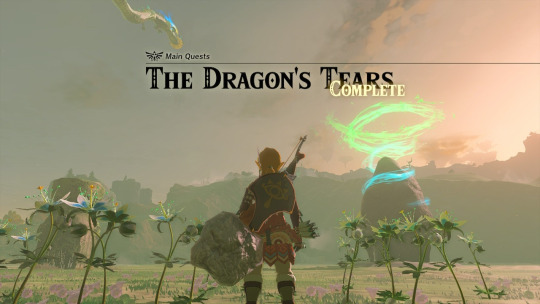
and now for some horse talk (TM): i kept the very first horse i caught out of nostalgia even though these stats are not very good. i think the naming scheme for this game will be H (the last game was C). the breath of the wild giant ganon horse is so funny. you can't do shit with this horse. you can't change the mane. you can't change the tack. you can't increase his stats. he's just There. Large.
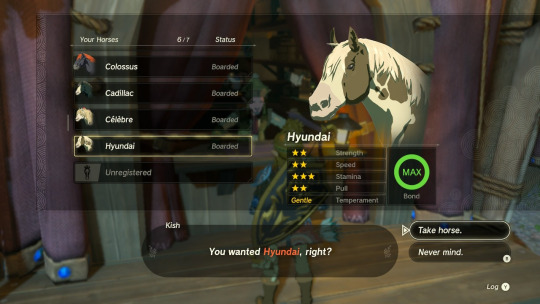

tangential horse talk: why is this lynel in the wetlands. his feathering and fetlocks are going to rot off. he is going to founder
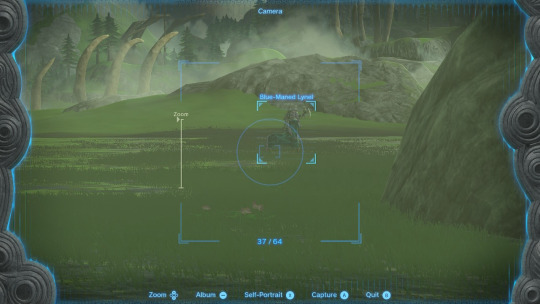
some places ASCEND works where i didn't expect it to: tree. water you can stand in.
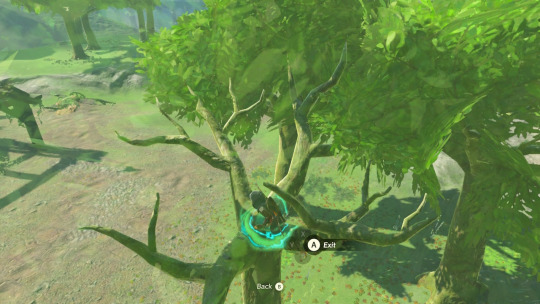
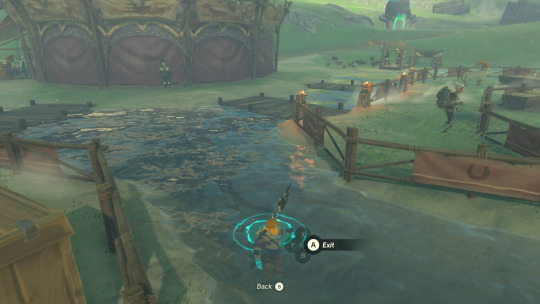
i stumbled across the last power completely accidentally while trying to deliver some eyes to a mysterious god and this was so fucking funny. i DID throw this guy down a big pit in the last game and he never came back. i forgot about that.
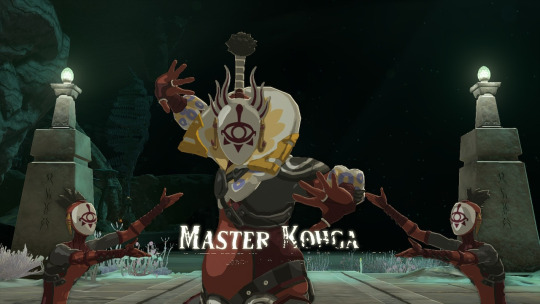
also people were fucking gaga for rauru but why didn't i see people talking about either of these two last summer on this, the -girl affix site and the scruffy shredded boy site
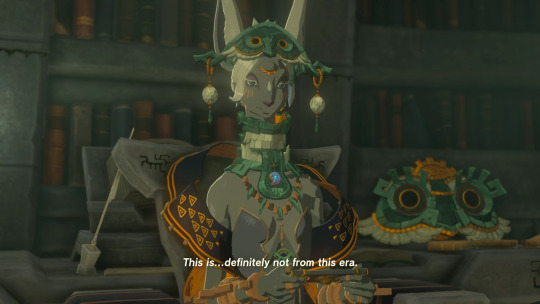

some other bits and bobs:
i was so annoyed patricia was part of the compendium in the last game i fucking got her this time ok
very hashtag relatable languages moment
unrelated to either of those things, i have done the gerudo sage quest except for the boss battle and i missed two huge swathes of hashtag tunnel gameplay (going to find riju through the tunnels. simply went overland) and getting to the central temple chamber (simply used ascend). whoops
there's a little tower concept art piece in purah's room in the ancient lab! that's a fun little touch i really love, it really helps differentiate the games and show changes in the overworld between games in a very cheap and east way for the devs
bc i play these games like dressup simulators, i also want to note that misko's tents are also really fun, they really feel like they're from a much earlier era and i'm stumbling across an untouched archaeological site

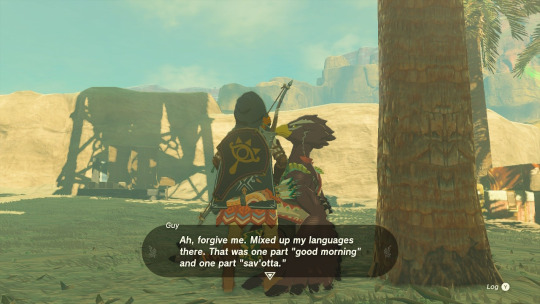
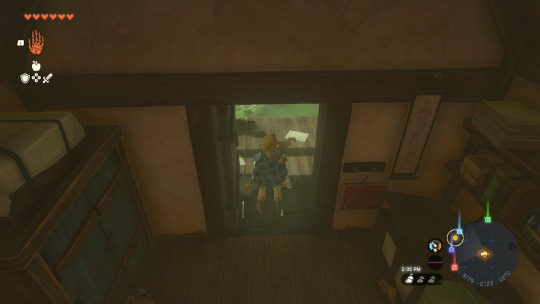

-
making
garden update: growing along okay, it has been so so so wet lately and i should have bitten the bullet and bought the big expensive bag of perlite, the drainage is not terrific. i should elevate all the planters and that would help a bit too. tomatoes are bit leggy, i moved them out of the partial shade on the end of the balcony and in front of the window. i am a bit concerned about them getting scorched, but again it's been so wet lately they need all the help they can get. i feel like they're established enough to be pruned a bit to make them bushier but i am Afraid. there are worse things in life than leggy tomatoes

the pic on the left below: these bush beans are looking a bit strange as well. the four shorter ones came up, promptly withered their cotyledons, and i thought they died until they popped out their first true leaves. the larger ones i think may have some kind of mosaic virus but it's a little early to tell. these are bins that haven't been used outside (they stored clothes in for the move) and new dirt from home depot. either the dirt or the seed stock itself may have been infected? very strange. the cucumbers in the bin in the back (hidden by the beans) are also taking forever to get going. at least the sweet peas are doing fine. the spinach i planted in that back bin withered where the stems met the soil and died. i think it was simply to early and too damp for them.
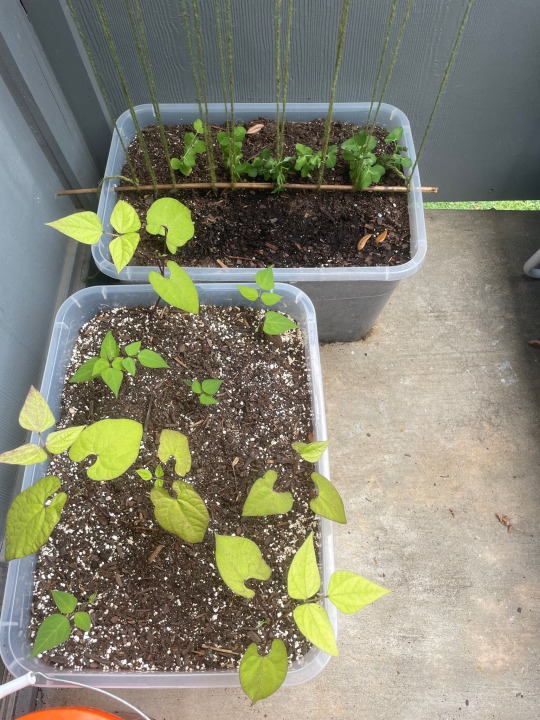

anyway on the right pic above: these normie peas and normie climbing beans seem to be doing fine. that's dill in the gray pot and basil in the bucket, they also seem to be doing fine. just sort of a perplexing corner on the other side of the balcony.
30 notes
·
View notes
Text
Unemployed and Uneducated
Summary: Peter is desperate for a job after months of living on his own
Warnings: none really, just a few mentions of loneliness and a lost relative

“Peter Parker?” A woman from the unemployment office calls into an overall dejected lobby. Peter looks up from holding his head in his hands as his knee bounces anxiously.
The same few thoughts flood his brain:
* I’m pathetic
* I can’t do this much longer
* I can’t do anything
* I need help
- Who the hell could I ask?
- I’m fucking alone!
- I couldn’t save May, who else can’t I save?
* I am so fucked in the head
- Lost everyone
1. First my parents
2. Ben
3. Tony
4. May
5. Everyone else, including my best friend, my doppelgängers, and of course, the love of my life
Man this shit is gonna give me a complex
* I am so depressed
- I should get medication
- I can’t afford medication
- That’s why I’m at a fucking unemployment agency
* And I’m back to being pathetic
“Here,” Peter pushes away all of those invasive thoughts for the next fifteen minutes in that woman’s office. She types his name into her computer and pushes her glasses up, as if that will change the astonishing lack of… anything.
Peter sits there, awkwardly, eyes darting around the room as if he has no clue about what she’s seeing— not seeing on that screen.
“I’m sorry,” she starts, “I think we’ll just have to “build your resume on print.” The red haired middle aged—Gina, Peter reads the name on the plaque on her desk— grabs a pen and some paper.
“So where did you graduate?”
“Oh, I uh… I had to, uh… dropout…?”
Gina nods and writes something down on the paper. She kinda reminds Peter of a glorified guidance counselor… but maybe a little meaner. “Look Peter, I’m not gonna lie to you, this isn’t looking good for you. Without a GED and a diploma shits gonna get real difficult. I seriously recommend you getting that GED. I can’t give you some entry level jobs to start until you get that degree.”
Now it’s Peter’s turn to nod.
“So tell me about what you like to do.”
‘Apparently, I like to self sabotage a lot.’ He filters himself so he doesn’t projectile word-vomit all over this stranger’s office.
“I wanted to be an engineer. I had my sights set on MIT before I had to drop out.”
———
Trying to think of a time before a traumatic event is extremely difficult. A victim of rape can be triggered by something that once was innocent, like a lemonade stand; a son who used to be pushed by his father on the football field might not be able to play football ever again after they stop talking to their father; a victim of domestic violence might not be able to respond to sudden movements from their partners the same way. And for all of those people, looking back on their memories before the abuse might be difficult to do with a totally unbiased opinion.
Something’s you never forget, like the way Aunt May felt in Peter’s arms just before she died. Or the words she spoke in those final moments, the same words his uncle Ben said when he died.
‘Nothing will ever be the same.’
Peter can’t afford flowers for May’s grave, but he still visits her grave three times a week on average, no less than two in that span.
And that’s where he is right now. Sitting across from her grave stone with his journal between the hedge and him.
“So I’m still looking for a job, and I haven’t really had time to make friends, but it’ll get better soon…” as soon as he feels a tear fall down his right cheek, he sniffles, blinks. And uses his sleeve to wipe it all away.
“Good God, May. Why didn’t you tell me it’d be so hard to make it on my own?” He chuckled somberly, the same way anyone would when they were trying to hide their emotions.
“I don’t want to keep going.” He cries. “I don’t know if I can.”
“You can.” A familiar, yet unfamiliar voice says from behind him. “She’d want you to.”
It’s Happy.
Peter closes the journal and stands up as fast as possible for him.
“Sorry,” Happy starts, “I didn’t mean to eavesdrop.”
Peter hides his face and can’t even bring himself to self to glance at Happy even by accident, “No no, don’t worry about it. It’s fine. I should probably leave anyways.” He starts to step away but Happy takes hold of his jacket sleeve.
“Wait, let me take you to get something to eat,” He smiles, “please. My treat.
Tom takes a moment to consider the offer. The most surprising thing about his moment of hesitation is the fact that he thought about saying no.
“Why would you want to take a stranger out to eat?” He asks.
“I don’t know. You just remind me of someone that I can’t quite place.”
Peter smiles with a glint of hope in his eyes.
— — —
“So,” Happy starts as Peter munches on his cheeseburger, “what’s a young kid like you doing visiting someone’s grave instead of going to school?”
Peter puts down the burger, “I had to drop out actually.” Happy leans back on the booth bench.
“It’s not drugs or anything,” Peter reassures the older man, “I just don’t have the money for anything and I need to earn money for rent.”
“So was May helping you with that before she died?” Happy asks.
Peter debates being forthcoming about his past, but decides against it because he doesn’t have the strength anymore. He lost that at the Statue of Liberty.
“Yeah. My parents died and she always managed to find someway to help me.” Peter smiled.
“I was her boyfriend,” Happy begins, “she never mentioned you. Peter, are you hiding something?” Peter gets a l little nervous.
“I went to the soup kitchen after school. She helped so many that she probably had no idea the effect she had on me.” He covers his ass.
Happy is still suspicious but doesn’t push. “Well, Peter, you seem like a good kid. I’m sure everything will work out eventually.”
“Thank you, Mr. Hogan.”
“So where’s the first place on your list?” He asks.
“What?”
“You said you’re looking for a job, tell me where you’re looking and I can give you a ride.”
“Stormy’s Autobody.”
#tom holland smut#peter parker angst#spiderman no way home#spiderman nwh#spiderman x black cat#spiderman#tasm spiderman#black cat#tom holland fanfiction#tom holland#peter parker#harrison osterfield#haz osterfield
27 notes
·
View notes
Text
Why is Mental Health Important?

One of the world’s most prominent suicide capital — is India. The higher rate of suicides in India is because of mental health disorders. It is reported that in India, every seventh person suffers from mental health and some even go through suicide attempts.
Mental health has a significant impact on the economics of a country as well; a report states that the economic loss in India due to mental health conditions is: USD 1.03 trillion. After knowing these stats, you may also wonder: How can mental health affect us, or why is it important…? Is mental health a severe health issue…?
Do not worry; we will answer all your questions by providing detailed information on why mental health is essential. To dispel any confusion about mental health, carefully read the information below:
What is Mental health?
A person’s complete psychological and emotional well-being is called mental health. It involves our everyday feelings, thoughts, and behaviours. Good mental health means that a person can handle the daily stresses of life, work productively, form and maintain healthy relationships, and make meaningful contributions to society.
Mental health disorders can range from mild to severe and include conditions such as depression, anxiety, bipolar disorder, schizophrenia, and personality disorders.
It is essential to prioritise mental health and seek help when needed, just as one would for physical health concerns.
Why is Mental health essential?
Mental health plays a vital role in your daily life activity and physical health and affects your psychological, social and emotional behaviour. Mental illness can also affect your daily routine: eating, sleeping, communicating, or socialising. All these lead you to a numbed state and can build solitary in a person.
Mental health is essential to behave normally, like regular eating and being productive at work and school. Rehabilitation for mental disorders can sometimes result in significant physical health problems, including heart attacks, stress, eating disorders, and many more.
Signs of Mental health Problems
We all want to protect or help our family members or friends going through the same, but that is only possible if you are aware of signs of mental health issues. Depression, Panic disorder, Intermittent Explosive Disorder/ Anger issues, Post-traumatic stress disorder (PTSD), Obsessive-compulsive disorder (OCD), Eating disorders, Anxiety, Sleeping problems, Isolation, and Trust issues are all significant signs of a person who is suffering from mental illnesses.
What causes mental health issues?
A severe psychological disorder can even lead a person to suicide, which cannot happen without reason.
So some common causes that can lead to a lifetime trauma/mental disorder in anyone are: Past trauma, abuse, or neglection, long-term and severe stress, social isolation, loneliness, grief, discrimination, along with long-term physical conditions, poverty, or significant debt, unemployment, a breakup or a divorce, dysfunctional family life, and criticism are the main reason of having a mental illness in most of the youngsters.
Here’s how you can heal from mental health
You can perform various spiritual methods or visit a therapist to heal your soul from these mental traumas or disorders. The Mental Healthcare Act 2017 provides and protects all the rights of people with mental health illnesses.
There are severe psychiatric services to treat your mental health issues, or you can ask for help from your family members or someone you can trust. Seeking therapy, Journaling, Practising mindfulness — like mindfulness meditation, Exercise, Yoga, or low-impact exercise, and Learning to communicate effectively can also be great for mental and emotional health.
A word from Enigmatic Horizon
Your mental health plays an essential role in your life; it affects how we think, act and cope with life. Performing regular tasks like eating or sleeping can be difficult while suffering from those issues. Mental health is far more important than anything else, so take care of your mental health and stand by your family member or friend if they are going through the same.
0 notes
Text
Blog Post #1
SadieLee Crume
Leadership and Social Change
UNST-242A-001 Fall
10/23/2022
Blog Post #1
Every night in America over 300,000 men, women, and children sleep in homeless shelters. This does not include the over 200,000 people sleeping out in the streets. It makes you wonder how we as a nation let this unfortunate situation get so overwhelming. 500,000 people are lacking stable, safe, and adequate housing every day. This issue is important to me because I believe as a human race we are failing one another. Many people have stopped caring and just want the less fortunate off “their” streets because it is an eye sore. These “eye sores” are just people that need some extra help. We have all received help from others in our pasts and now it is our turn to show kindness. 7 out of 10 people in America are one paycheck away from being houseless. With enough series of unfortunate events, this could happen to you or someone you know. The only thing that is separating “us” from “them” is money. Our nation is systemically built for people to fail. We need others to fall so others can succeed. Apparently, we think that there has to be this unbalance for our country to function correctly. The main reason for the drastic increase in the cost of living, rent prices raising, and inflation as a whole.
Historically it is believed that the origin of this problem tracks back as early as the 1640s when vagrants were defined as outcasts of society. With time homelessness emerged as a national issue in the 1870s. When the Great Depression came about the unemployment stats raised due to the economic crash our nation was facing. These were the building blocks for where we are today with this unfortunate issue. Portland Oregon has been in a state of emergency regarding homelessness for three years now. This is not going to be an easy problem to solve. If it were easy we wouldn't still be seeing starving people on almost every corner. We have lost sight of the definition of community and need to be putting it into action. There has been some action taken with state officials but I believe we need the working-class citizens to pick up the slack where the government is falling short. We can all make a difference if we listen and care instead of getting annoyed and turning a blind eye.
I am from a small town that did not have much homelessness and I am witnessing it up close for the first time in my life I am trying to understand how they got here. When I first moved to Portland in 2021 I was living in South East where it was extremely gentrified. I am now living in North East and have seen the effects of this rapid growth of gentrification. There are homeless camps in my neighborhood on almost every corner. I may be passionate about this topic because it is new to me but also because it affects the place I live and want to help the people who live here as well, even if they don’t currently have a permanent place to call home.
What comes to your mind when you think of the word homeless? What do you see? How do you feel? If your first reaction isn’t sympathy then you may be a part of the problem. If we don’t start caring more and working on these issues then the problem will get so large that it may be unsolvable. The problem is already large but we can’t let it keep growing because it impacts the availability of healthcare resources, crime, safety, jobs, and the use of money. Homelessness impacts the present and future. Breaking the cycle of homelessness, one person, one family at a time will be beneficial to all. Furthermore, we can take hold of our humanity again and be proud.
Sources:
“59% of Americans Are Just One Paycheck Away from Homelessness - Invisible People,” June 14, 2021. https://invisiblepeople.tv/59-of-americans-are-just-one-paycheck-away-from-homelessness/.
Texas Homeless Network. “A History of Homelessness in the United States,” August 13, 2021. https://www.thn.org/2021/08/13/history-of-homelessness/.
CaringWorks, Inc. “Community Impact | The Community Impact On Homelessness.” Accessed October 23, 2022. https://www.caringworksinc.org/our-impact/community-impact/.
National Academies of Sciences, Engineering, Health and Medicine Division, Board on Population Health and Public Health Practice, Policy and Global Affairs, Science and Technology for Sustainability Program, and Committee on an Evaluation of Permanent Supportive Housing Programs for Homeless Individuals. The History of Homelessness in the United States. Permanent Supportive Housing: Evaluating the Evidence for Improving Health Outcomes Among People Experiencing Chronic Homelessness. National Academies Press (US), 2018. https://www.ncbi.nlm.nih.gov/books/NBK519584/.
1 note
·
View note
Note
I've always wondered this, but what do you think the Cullen's political viewpoints would be, given their individual backgrounds? if vampires don't change after they turn, then surely they would all be extremely racist (especially Jasper). would this not come up at some point? they aren't like the Volturi because the Volturi are too old to care, but the Cullens are young enough that they have been brought up with opinions on stuff like sexism, racism, homophobia and the like.
Oh fuck.
You get an early answer because otherwise I'll just chicken out and delete this one, pretend I never saw it.
UMMM.
Since I'm guessing you meant American political viewpoints, we need a disclaimer. I am not American, and not too knowledgeable about your politics. Not just in the sense that I don't follow the day-to-day drama, but as I am not an American citizen there are several things I don't know, can't know because I've never lived in your country and therefore can't know what the effects of living in a country ruled by American policies is like. What I do know is based off of the news in the foreign section, social media (by which I mean tumblr posts), and Trevor Noah's Daily Show.
I am an outsider looking in.
Which is really rather appropriate, since the Cullens are too.
The Cullens go to high school and college, Carlisle works, they pay taxes, they own real estate, and submerge themselves in American culture. Esme, Edward, Rosalie, Emmett, and Bella are young enough that this is in many ways their world, and apart from timeouts they've more or less spent their entire lives, human and vampire, integrated into American society.
Not fully integrated, mind you, they do what they need to to fit in and get to school or, in Carlisle’s case, to work. They go no further. No extra-curriculars for the kids, no book clubs for Esme, no game nights for Carlisle. They walk parallel to humans, not among us.
In addition to this they're obscenely rich, which puts them another thousand miles from the experiences of your average American. They won't deal with the health system, which means healthcare is a non-issue, they're not going to need welfare or other social programs, unemployment is another non-issue. Name your issue, and the Cullens don't have personal stake in it. Even the climate crisis won't be a problem for them the way it will for us.
What I'm trying to say is, American political issues are a concept to them, not a lived reality. Just like they are for me. So hey, you made a great choice of blog to ask.
I'll also add here that you say the Volturi are too old to care, and I agree- from an ancient's point of view, racism is a matter of "which ethnicity are we hating today?", and it all looks rather arbitrary after a while. Same with every other issue - after a while it all just blends together into "what are the humans fighting over today? Which Christian denomination is the correct one? Huh. Good for them, I guess."
I can't put it any better than this post did, really. The Volturi are real people, humans are nerds and tumblr having Loki discourse. Aro thinks it's delightful and knows entirely too much about Watergate (and let's be real, Loki discourse as well), but the point I wanted to get at is that politics really don't matter to vampires.
And I don't think they matter to the Cullens either.
So, moving on to the next point while regretting I didn't put headlines in this post, I'll just state that I don't think vampires' minds are frozen. Their brains are unable to develop further, and they can never forget anything, but... well, this isn't the post for that, but in order for this to be true of vampires they would barely be sentient. They would not be able to process new impressions, to learn new things, nor to have an independent thought process. Yes, we see vampires in-universe (namely, Edward, who romanticizes himself and vampires) believe they're frozen and can never change, but there is no indication that this is a widespread belief, or even true. Quite the contrary - Carlisle went from a preacher's son who wanted to burn all the demons to living in Demon Capital for decades and then becoming a doctor and making a whole family of demons. Clearly, the guy has had a change in attitude over the years. Jasper, in his years as a newborn army general, slowly grew disenchanted with his life and developed depression. James initially meant to kill Victoria and hunted her across the earth, then became fascinated and changed his mind about it.
Had these people been incapable of change, Carlisle would still be hating demons, Jasper would be in Maria's army, and James would still be hunting Victoria.
It goes to follow, then, that they are able to adapt to new things.
The question is, would they?
Here I finally answer your question.
So, we have these people who don't really have any kind of stake in politics, who keep up to date all the same (or are forcibly kept up to date because high school) and are generally opinionated people.
Where do they then fall, politically?
(And this is where you might want to stop reading, anon, because I'm about to eviscerate these people.)
Alice votes for whoever's gonna win. She also makes a fortune off of betting each election. Trump's 1 to 10 victory in 2016 was a great day to be Alice. MAGA!
The actual policies involved are completely irrelevant, she does this because it's fun. Election means she gets to throw parties. Color coded parties for the Republican and Democratic primaries, and US-themed parties for Election Night! (Foreigner moment right here: I at first wrote "Election wake" before realizing that's not what y'all murricans call it.)
Alice loves politics. Doesn't know the issues, but she sure loves politics.
Bella votes Democrat. She actually knows about the issues, and cares about them. This girl is a Democrat through and through.
Carlisle doesn't vote. I can't imagine it feels right. Outside of faked papers he's not a US citizen, this is meddling in human affairs that he knows don't concern him.
More, this guy has never lived in a democracy.
In life, Carlisle lived under an absolute monarchy that, upon civil war, became an absolute theocracy. From there he learned that vampires live under a total dictatorship.
For the first 150 years of his life, democracy was that funky thing the Athenians did in history books thousands of years ago, no more relevant to him than the Ancient Egyptian monarchy is to me. Then the Americans, and later other European countries started doing this.
Good for them.
There's this mistake often made by those who view history from a... for lack of a better term, a solipsistic standpoint. A belief that the present day is the culmination of all of history. “My society is the best society, the most reasonable society; all the others had it backwards. Thank god we’re living in this enlightened age!”
The faith in our current system of government is one such belief. We (pardon me if this doesn’t apply to everybody reading this post) have grown up in democracies, being told this is the ultimate form of rule, and perhaps that is true - but remember the kings who have told their subjects they had were divine and the best possible ruler based on that. Remember also that most modern democracies haven’t actually been democracies for very long at all, America is the longest standing at some 230 years (not long at all in the grand scope of things) and they have a fracturing two-party system to show for it.
Every society, ever, has been told they’re the greatest, and their system of government the most just. Democracy is only the latest hit.
This is relevant to Carlisle because he’s immortal and decidedly not modern. Democracy has not been installed in him the way it was the rest of the Cullens, Jasper included. To him- well, it’s just not his world. He has no stakes in our human politics, and as he is older than every current democracy and has seen quite a few of them fall, he’s not going to internalize the democratic form of rule the way a modern human has.
I think the concept of voting is foreign to him.
It requires a level of participation in human society that he’s simply not at. He does the bare minimum to appear human so he do the work he loves, but nothing more, and I find that telling.
As it is I think he'd be iffy about his family doing it. He won’t stop them, but in voting they’re... well it’s kind of cheating. They’re not really citizens, none of this will affect them, and by voting they’re drowning out the votes of real human voters. He does not approve.
Edward votes Democrat. He's... well he’s the kind of guy who will oil a girl’s bedroom window so he can more easily watch her sleep without being discovered, justifying it to himself as being okay because if she were to tell him to get lost he’d stop immediately. Same guy is so sure that he’d leave and never return again if she wanted him to, except this is the man who returned to Forks to hang around his singer, knowing there was a significant chance he might kill her. To say nothing of his Madonna/Whore complex, or of the fact that he tried to pimp out his wife twice, and was willing to forcibly abort her child.
This guy is very much in love with chivalry, with being an enlightened and feminist man who supports and respects women, while not understanding the entire point of feminism, which is female liberation.
He votes Democrat because he’s such an enlightened feminist who cares about women’s rights.
Emmett doesn’t care to vote, but if he has to he votes Republican. The guy is from the 1930′s, and has major would-be-the-uncle-who-cracks-racist-jokes-if-he-was-older vibes.
Esme doesn’t vote, that would require getting out of the house.
More, I just... can’t see it. I can’t see her being one to read up on politics and The Issues, period, but if she has to then I doubt she’d be able to decide.
Jasper doesn’t vote. Alice can have her fun, he does not care.
There’s also the whole can of worms regarding the last time he went to bat for American politics.
I imagine he stays out of this.
Renesmée doesn't vote. She has no stock in the human affairs. Who would she vote for, on what grounds? When Bella tries to pull her to the urns, she points out that she's three years old.
Rosalie, guys, I’m sorry, but that girl is definitely gonna vote Republican. Perhaps not right now as it’s become the Trump party of insanity, but the Mitt Romney type of Republicans? Oh yes.
And for the record, yes I imagine she does vote. To step back from politics would be another way she was relinquishing her humanity, and that’s not allowed to happen. So, yes, she goes to the urns, less for the sake of the politics involved and more because like this, she’s still a part of society in some way.
Now, onto why I think she’s Republican, I think it’s both fiscal and social.
This girl was the daughter of a banker who somehow profited off of the Depression, and who then became part of a family with no material needs that would soon become billionaires thanks to Alice. Poverty to Rosalie is a non-issue, as it is I imagine she views it as a much lesser issue than what she’s had to deal with. The humans can pull themselves up by their bootstraps, Rosalie’s infertility is forever.
Rosalie’s empathy is strongest when she’s able to project onto others, and she won’t be able to project onto the less fortunate at all.
Then there’s the fact that the Republican party is all about traditional family values, and pro-life.
Rosalie, a woman from the 1930′s who idolizes her human life and who‘d love nothing more than to get to live out this fantasy, is down for that. And as of Breaking Dawn she’s vocally pro-life, so there’s that.
This all being said I don’t think Rosalie cares to sit down and fully understand these politics she’s voting for, the possible impact they’ll have- that’s not important. What’s important is what voting does for her.
TL;DR: I bet anon regrets asking.
#long post#twilight#twilight vampires#twilight meta#twilight renaissance#politics#history#twilight history#carlisle cullen#alice cullen#bella swan#renesmée cullen#jasper hale#rosalie hale#emmett cullen
322 notes
·
View notes
Text
Thoughts on Endings and Ethical Creativity
I’ve been thinking a lot about how most of the best stories I’ve watched or read have had a bittersweet ending. I think this is because it is the most likely scenario any of us will repeatedly encounter in life as we end relationships, change careers, move away, bury loved ones, etc. It’s a place where contentment, happiness, and grief can coexist. By extension, it becomes the ending that feels truest.
Whether you personally prefer an ending that might “feel truest” or not isn’t really what I’m on about here. I’m thinking in terms of writing and what resonates widely, while also being creatively responsible.
A happy ending, while nice on occasion and appropriate for some lighthearted genres, often rings false and patronizing if it’s not earned. It doesn’t help that there’s always the chance something will go wrong in our happy characters’ futures that makes it hard not to squint. (Sure, the lovers kiss at the end, but do they survive, I don’t know, parenthood or 2020, or, dear Lord, parenthood in 2020, if they’ve experienced no real hardship?) Sad endings can ring false for a similar reason. Barring death of the primary POV character, there’s always a chance things will turn around, so why end on a depressing note? (Our beloved protagonist is destitute and alone by the story’s ending, but he’s only forty. What are the odds he stays downtrodden indefinitely? Isn’t the story of how he might not rather interesting?)
Overly happy or sad endings that haven’t earned their place through foreshadowing and tone often come out seeming too fanciful/childish, intentionally depressing, or downright incomplete. In my mind, this usually means an ending that shows striving is what will resonate most. Striving for or toward what, exactly, depends on the story. Unless you’re dealing with a character who truly has no reason to work toward or hope for more (e.g., they don’t die, but they have every reason to believe endless misery and/or death is coming soon), ending on a completely sour note seems strange.
And if by the end of a story, a writer finds the only way to impart meaning upon the narrative is to kill off a beloved character unexpectedly, I question the integrity of the story. Death is inevitable and only sometimes predictable, but that’s not a story we need told to us; life teaches us that lesson. The stories we love to tell ourselves tend not to reflect reality, either; they make sense of reality’s chaos, including its unfair death. Often, stories are here to show us death can be faced or even cheated, or that our inability to face its inevitability will be our downfall. Loss is not the interesting part of the story; it is not what imparts meaning. It is how loss is (or is not) faced that makes the story.
Maybe that’s why bittersweet endings work so well. When are we not losing something, even as we are gaining anything else?
On Last-Minute Character Deaths
Related to the above is the question of whether writers owe audiences closure, and I think they do. I’m not one to “cancel” or censor really much of anything, even socially, but as our understanding of mental health and well-being grows, I’ve begun to question the ethics of last-minute tragedies in larger works. It strikes me as privileged and perhaps able-bodied/minded to assume you can knife your audience and their wound will heal without your care to aid them.
As numerous shows have killed off beloved lead characters in or near their series finales in the past few years, I’ve been troubled to think about how many struggling viewers have had to face them, especially this year. We’re surviving tyrants, a pandemic, record unemployment, spikes in domestic abuse, spikes in suicide. It is a dark time.
Does that mean coddling or treacly happiness is what the doctor ordered? No, treacly happiness, unearned, is nearly as frustrating as unearned tragedy, though less likely to cause psychological damage. But I do think it means writers have a duty to tread carefully. Stories matter, and the audience who hears, watches, or reads them matters. By all means, kill a main character, but lay the groundwork for that death and let your audience process the grief with the characters who remain. If this is a main character who’s been around for multiple books or dozens of episodes, realize the grief won’t be processed in a few pages or a single episode.
You can do anything creatively. You can explore any and all dark subject matter. But I think if you close with unexpected pain, you’re not here to write a tragedy, you’re here to be a sadist to people who did not consent to being masochists. Do this to enough people, and you will find your masochists in the crowd, but that doesn’t mean their acceptance of your sadism is more valid than the outcry of those who would never have consented had they been informed.
Endings matter. They’re not to be tacked on as an afterthought or to be used to make a petty point (unless that was the point). Endings are what stay with audiences on their own life journeys. This is a meaningful and potentially powerful connection between creator and audience member that deserves honor and respect.
#writing#me irl#there are examples of GOOD endings that end on character death#six feet under#breaking bad#nurse jackie#to name but a few#those were entirely earned and foreshadowed#they were not sucker punches#surely i don't have to name all the shows throwing sucker punches#they're notorious by now#it's unsurprising that it's mainly straight white men with creative power who think sudden death without room to grieve is somehow deep#no my dudes#you're just emotionally stunted#because once upon a time someone taught you that processing emotions was weak#and no i never watched spn#but i do get tired of seeing stories destroyed#which is why i mostly only watch finished series#lucifer got me tho
372 notes
·
View notes
Text
Unriddling the Sphinx: Autism & the Magnetism of Gender Transition
When people note that "trans children" tend to have autistic traits and that children with an autism diagnosis (particularly natal girls, but also boys) are massively overrepresented in the population that is referred to assessment and treatment for gender dysphoria, many trans people's (and allies') response is that it is a kind of dehumanization and denial of agency to claim that autistic people cannot be transgender, do not have the right to seek gender transition, or that they may be vulnerable to being exploited by the transgender healthcare system. Most recently, this claim has come up again with regards to a recent piece by Harry Potter author J.K. Rowling, where among many other things she notes the enormous increase in child referrals to gender clinics, including a disproportionate number of autistic children, to explain her reticence to endorse the political stances of modern transgender movements.
This is my response as an autistic woman, who was once an autistic child, who is a lesbian with experiences of gender dysphoria and who once wanted to transition to male.
-----
1.
Recognizing our vulnerability to social predation and to cultural systems that we do not understand because they were not made for us is not offensive. As autistic people, it is key to claiming our autonomy as a particular kind of disabled person. We often do not recognize our limitations in reference to greater social systems not because we are "too stupid" (i.e. cognitively or intellectually limited) but because we have different value systems than neurotypical people and hierarchical institutions built for their benefit. Autism is a pervasive developmental disability, and it is a way of being. It is not merely being a "regular person" minus various clinically defined psychological capacities or skills. It is a difference across all domains of life, and as a disability that causes differences in our social and sensory perception it is also a disability that causes differences in what we want and what we care about.
Both those who exhibit condescending "concern" for autistic people and those people who naively defend our right to do whatever we see fit miss this component of being autistic. It is not that we are merely vulnerable because we are missing parts of our decision-making or social skills apparatus. It is not that we are merely being unfairly denied what we want to do, and our autism is immaterial, just some excuse for the denial.
It's that we aren't recognized as having wants, only "special needs". It's that we aren't given the skills to know what it is that we want, or that it might be different from those around us. It's that we are never told how to get what we want in safe and healthy ways, or that there is even a potentially safe and healthy way to get it. It's that we are deemed automatically pathological and empty of internal experiences as autistic people. It's that we're not given any help on how to navigate our deep differences from others and how to navigate being deprived of social resources and networking in a way that doesn't tell us to just cover it up and deal with it. It's that most people who dedicate their lives to "helping" us do not care about any of these things, merely that we can be trained to act in a way that doesn't disrupt the lives of neurotypical people.
Given this context, it is far more insulting to me to insist that having autonomy renders us somehow invulnerable to exploitation than to correctly perceive that we are in fact an intensely vulnerable people. By nature of our disability, we are always on the margins of social resources and social networks, and exercising our autonomy unfortunately often puts us even further outside social acceptability and social protection rather than somehow shielding us materially from the consequences of living a self-actualized autistic life. Few autistic people are prepared for this when they begin trying to make decisions "true to self" in adolescence.
I believe nearly every autistic person is traumatized from the consequences of living in this world and what others do to us. Clinicians do not usually recognize that autistic children and adults can be traumatized, that there is even anything there to traumatize. (Why else could they feel so comfortable shocking us, shackling us, or feeding us bleach?)
-----
2.
I think because we are not neurotypical we often struggle to understand just why a neurotypical person would feel ok excluding us, or maybe even anyone. Many of us autistic people have little impulse to do such things, and if we do, we rarely have the social power to make someone that we've cut out of our lives unemployable, unable to access medical care, food, housing, and so on. But neurotypical institutions are set up, from top to bottom, to create hierarchies of value with extreme material difference between the top and bottom. They are set up to stratify the "worthy" people from "unworthy" people.
Autistic people are almost universally considered "unworthy" in these systems, and to the extent that we can curry favor from them we must consent to our exploitation: to entering into a transaction on neurotypical terms, where we can get some sort of worth through providing a "benefit" to this hierarchical resource system which is not made according to our value system or for us whatsoever. This is common to all marginalized people. But it is often particularly poignant to autistic people, who struggle to find community with any social group of human beings. There is no "elsewhere" for us, there is no "home". We are stuck, as they say, on the "wrong planet", and the spaceship was destroyed.
The idea that exercising our autonomy would protect us from this world rather than render us more vulnerable because we are refusing to transact correctly or refusing to provide a benefit is utterly absurd. Our autonomy is perfectly compatible with our continued social ostracization and exploitation. It usually coexists with our continued social ostracization and exploitation.
In social skills classes-- or just the wild, wild world-- you are not taught how to deal with the fact that everyone will hate you for being you. You are taught to be someone else. You are not taught about your native autonomy. You are taught about how to put your hands here or here, how to choose between actions that are condescendingly and ridiculously normal. You are not taught how to take responsibility in a way you understand, that is harmonious to your own values and others'. You are taught to hold yourself accountable for your abnormality.
So forgive me if I do not believe for one second that impersonal, well-funded medical systems that were built off of medically experimenting on intersex children and adults (the nightmares wreaked by John Money at Johns Hopkins) or psychologically experimenting on behaviorally aberrant children (UCLA, where behaviorist torturer of autistic children Ivan Lovaas tinkered with gender nonconforming children alongside conversion therapist George Rekers) have autistic people's self-defined well being in mind.
And forgive me if I do not think informed consent clinics have autistic people's self-defined well-being in mind when they're more interested in rubber stamping hormones while shielding themselves from legal liability than assisting autistic adolescents and adults, who have an intrinsically different way of understanding gendered social norms, navigate the enormous complexity of how to interface with the single most fundamental social fixation of the neurotypical world as someone who will always and automatically fail.
-----
3.
I do not think most gender clinicians even have the first understanding of what it means to be autistic and what this does in and of itself to your understanding of gender and sexuality. What J.K. Rowling said in her piece-- a straightforward accounting of facts-- is far, far less insulting to me than what Diane Ehrensaft-- one of the premier "experts" in the United States on pediatric transgender cases-- published in a peer-reviewed journal on autism. In a 2018 letter to the editor reading remarkably like new-age material on Indigo Children, she writes that she likes to call autistic transgender children "Double Helix Rainbow Kids" and declares us "freed" from the restrictions of gender as "more creative" individuals. This article ends with an anecdote about an eight year old autistic female child with limited language use who begins speaking, making eye contact, and relating more appropriately with clinic staff after she is socially transitioned by her family. Ehrensaft muses, "“Could gender be an alleviator for the stressors of autism?”
She is not the only one to pontificate about the magical changes a gender transition brings on autistic children. Norman Spack (the first clinician in the US to use GnRH agonists on gender dysphoric children as puberty-suppressing drugs) claims in a coauthored, peer-reviewed 2012 paper (insults upon insults, in the Journal of Homosexuality) that in his clinical experience the symptoms of comorbid diagnoses--including "problems with social competence"-- "decrease and even disappear" with gender treatment. In the same paper, this passage appears:
Although the question of whether gender dysphoria is simply a symptom of an autism spectrum disorder has been raised by mental health clinicians in the field, we feel it is equally worth questioning the validity of an autism diagnosis among transgender youth, particularly of those diagnosed with Asperger’s disorder. Perhaps the social awkwardness and lack of peer relationships common among GID-Asperger’s patients is a result of a lifetime of feeling isolated and rejected; and maybe the unusual behavior patterns are simply a coping method for dealing with the anxiety and depression created from living in an “alien body,” as one patient described it.
Do autistic trans people-- who rightfully protest against mainstream autism organizations focusing on a "cure" for autism rather than respectful accommodations for our differences and medical needs-- know that very well-connected, very respected, and very powerful gender doctors are claiming that gender transition cures the symptoms of autism? Do autistic trans people-- who rightfully discuss the implications of denying that someone can both be autistic and hold a meaningful gender variant identity-- know that it is an active clinical debate as to whether or not their disability and all its struggles is "just" a result of somehow ending up in the "wrong body"?
If they do not, they should know that this is how doctors are perceiving the pervasive issues that the children in their care are having: not as the result of a life-long, stigmatized, but eminently livable disability, but as the result of a mystical gender failure that can be medically corrected. That essentially, the disability "goes away" so long as outsiders no longer perceive a problem with a child's conformity to gender norms. That either an autistic girl somehow is transfigured into a non-autistic child through transition, or more likely, an autistic girl's autistic behavior is unfitting for her as a girl but not for her as a boy. That the "proof" of pediatric transition's effectiveness and standard of an autistic child's happiness is how much the child wishes to participate in neurotypical society on neurotypical society's terms.
I cannot pretend that this isn't ludicrously disrespectful to autistic people, or that it isn't a total erasure of our experience as human beings. To these gender doctors, the fact that a girl might see the world in a different way and care about different things and thereby struggle in a world not made for her does not matter whatsoever, except maybe as a tokenistic "journey" she can go on alongside her wonderfully progressive and affirming doctors. What "autism" is for them is a particularly severe and inconvenient social adjustment problem which can be forcibly corrected through body modifications, should an autistic child or adult rightly note that they can't do gender right and this is causing problems for them. They are more interested-- like in a long history of abusive and even deadly "treatments" for autism-- in correcting the problem for them than for the autistic person. How convenient for neurotypical people both the gender incongruous behavior and the social noncompliance goes away once you medically modify a child to look like the other sex.
I cannot be anything but sick that "increased eye contact" is a sign an autistic child needed medical meddling in the intimate process of navigating and negotiating their sexual and gender development. I cannot trust that these doctors aren't missing enormous parts of their autistic patients' experiences, if this is what they are so gleeful to report as a positive transformation and their justification for disrupting and surveilling children's bodies. What do they think of autistic people and those who are gender non-conforming if they are so willing to believe that existing as a person with a stigmatized disability is actually just a misdiagnosis for the pseudoscientific condition of being a man in a woman's body, or vice versa?
-----
5.
It takes many, many years and quite a bit of luck and support for most autistic people to fully understand and come to terms with how their autism affects them and sets them apart from both individual neurotypical people and neurotypical society at large. It takes years-- often far, far into adulthood, especially for those abused under a medical model or for those who went decades undiagnosed-- to understand the differences between social and non-social aspects of this disability.
It takes years to not resort to chalking up all of your own distress and difficulties to being a "retard".
I have not met an autistic woman yet who did not have extreme difficulty integrating her autistic differences in values with a broader sense of self that includes whatever version of herself she uses to navigate a world in which women's values are simultaneously invisible (since she has no right to determine them herself) and nitpicked to death (since it is important she complies).
In a world like this why would it not be difficult for autistic people to know when it is they are being fooled or exploited while participating in transgender communities or while seeking transgender health care? Autistic people-- especially those who are dependent on caregivers or health systems for basic care, as well as those who depend on the goodwill of their families, employers, or welfare benefit institutions to remain as independent as they can-- have to make continual compromises just to maintain enough acceptability to communicate with the outside world nonetheless do things like "make a friend", "go to the doctor", "find a job".
I do not think neurotypical people understand or care that when I speak or write it is always with a similar effort as with a second language. Language-- whether it is verbal or nonverbal, with all the extensive symbology of the neurotypical world-- does not ever get to be something other than "translation" for me. As someone with an Asperger's-profile of abilities who has studied the neurotypical world intensely for years, I have the opportunity to translate in a way that allows others to understand me at least some of the time. Many autistic people who are more affected live in the world which gives "autism" its name, where nobody cares to do the translation for us and we are left totally and utterly alone.
The 20th century philosopher Ludwig Wittgenstein (who, perhaps not coincidentally, was likely autistic) was fixated on questions about the meaning of communication. About whether a language of one could make any sense, about what it would mean to speak about something hidden from everyone else or perhaps even ourselves. In a famous passage debated vociferously, he wrote, "If a lion could speak, we would not be able to understand him."
Many have resolved the question posed by this statement by claiming that for fuck's sake, a lion is a lion, and has nothing to say.
-----
6.
Gender transition appealed to me because it was cloaked in the farcical notion that there was some version of me and my body that could finally speak directly. I never quite understood the whole Adam and Eve story as an autistic child-- just don't eat it!-- but if there truly were a serpent's apple for autistic folks it would consist of this promise: that there was a world where the glass and the fog would dissolve, that we weren't covered in a repulsive and bumbling slime made of our own desires to understand, that instead of our words and hands glancing off the skin of everyone around us we could do that magic everyone else could and hold someone's heart in our hands.
I was fooled because like many struggling autistic people, I wanted the problem to be me. Because then it was fixable. I would let them take my only body (which was such a sensory drag) to convert me into one of these blessed transponders that normal people were, receiving and sending all these messages like shooting stars blazing through the unimpeded vacuum of space. Without my femaleness and without the Difficulties That Should Not Be Named, I could send whatever message I wanted to whoever I wanted and it would be received, I could be gregarious, important, sexually compelling; my will and autonomy wouldn't be stifled by 140 pounds of dumpy, itchy flesh with an overbite and slack hands.
When I imagined myself as a man I didn't imagine myself like most of the childhood boys I managed to ingratiate myself with, who lisped, repeated themselves, and tripped over their own shoes. I imagined myself as a musician who was absolutely magnetic, I imagined myself as a writer with a legacy, I imagined myself telling other guys they were stupid shits and they could fuck off. I imagined being able to hold onto a football without dropping it, being able to smoke weed without getting a migraine, being able to talk without squeaking or letting out a little drool.
I thought I would finally be a human being with no embarrassments and nothing that could get me bullied in the bathroom between class. I thought when I would say "no", other people would listen. I would enter whatever mystical world it is that Ehrensaft names, made of messages and meanings, where every twist of word and piece of clothing said something, connected by a fine filament back to that Necronomicon filled with the runes of social symbology. And it would make sense.
I would become a lion, not a house cat. And the lion would speak. And we would understand him.
-----
7.
It is a neurotypical narrative that this is what transition can do for you, because it is what someone else's transition does for neurotypical people. A gender transition is magical because it decodes the lion. It unriddles the sphinx. The autistic person must be happier now, because the neurotypical person is happier now. (And who has an empathy deficit?)
But if I have learned to be afraid of anything as an autistic person it is not my own neuroticism and fixations, but those of the so-called "normal people". Forget double helix rainbows: being an autistic person is like your DNA is a converted school bus trundling through the world in spray-painted glory and the whole world has an HOA. I understand why autistic people who see themselves as transgender see "concern" as the busybody stupidity of the neurotypical world. They aren't wrong. But it exists alongside other mundane and brutal busybody stupidities, such as grant funding, progressive saviorism, and psychiatric god-complexes.
To understand and resist what the neurotypical world communicates to us about our worth is not to protest back to them in their own language. I am an autistic woman and like many other autistic women I am tired of not only making myself more palatable but translating my existence into something intelligible to outsiders, who are both men and the non-autistic. Radical feminists miss one of these; trans activists and allies miss the other. But I am irrevocably othered from both.
When you are autistic you are taught only one symbolic structure. It is not your own, but it is the only medium you will ever have to communicate with any complexity. More sinisterly, it becomes the only medium we have to communicate to ourselves, the only medium we can use to work around the silent and jumbled parts of our bodies and minds. Am I hungry? It is not always obvious. To ask the question I find myself translating, even when alone.
My fantasy about lions and men was that whatever world a lion lived in and whatever he had to say, he did not need to translate, and especially never to himself. When a lion says something he does not stop to ask if he means what he says or who is saying it. When a lion looks into the water hole and sees his own reflection, he does not need to reconcile anything. The lion does not need to speak to understand himself. A lion is made of teeth and blood and claws and the lion just does.
I do not use the symbolism of transgenderism to explain the little gaps and incongruities that are my problems with gender, with my sexed body, with sexuality. It is not only a language born of neurotypical neuroses and regulation, but it is always and forever fundamentally a translation.
As an autistic woman I have spent my whole life avoiding these dual facts, through both my time thinking of myself as trans and while trying to understand this whole thing afterwards: I am my body and I am not my body. Because I speak, but I do not understand. Because I understand, but I do not speak.
I will, unavoidably, always have to translate to speak and understand. But my autonomy requires that at bottom I must respect the native communication of my own body and mind. I refuse to use force or coercion to get it to talk, to interrupt its silence, to confabulate stories on its behalf, to speak for it using assumptions it cannot confirm or deny. I have to make peace with the fact that sometimes the blanks of my body or the redacted corners of my mind will say nothing. I have to make peace with the fact that translation is always inaccurate, that something is always beyond that constellation of symbols and words. The autistic body and the autistic mind have their own boundaries, and I refuse to believe that exercising my autonomy requires breaking them.
I do not know if J.K. Rowling knows this. I hope you do.
296 notes
·
View notes
Note
(Not sure if this was asked before... Tumblr search pulled up nothin, but it's Tumblr so...) Can you, in the simplest terms possible, explain what stocks are? I know they're important for. Some reason. And that they can screw with my life, based on the stock market crash at the end of the '20s. So it'd be nice to know what they are, why they're so impactful... And maybe why we have them in the first place.
Hmm so I'm not really an expert myself since it really is a complex field but I can definitely explain the basics. At the very basic level stocks are ownership in another company and a way to invest in it. If I have one stock in Walmart, I actually own a (very minuscule) part of it. As a part-owner I share in the profits by being paid in dividends and I can vote on decisions the company makes. If I think a company is going to do well in the future, or I just want to support it, I can invest in it by purchasing stock. The company can then take that money and use it to expand their business or just fund operations.
However, the modern stock market is considered public, ie: anyone can buy a stock. The opposite "private" situation would be for example, if I started a dog-walking business and my mom invested by giving me $1000 in exchange for owning part of it. She would want to own part of it in the hopes that it becomes successful and more valuable later on, and she could later sell the part she owns for a profit. Random people can't invest in my dog-walking business, though, unless I do an IPO (initial public offering) and offer stocks to anyone who wants to buy them.
Another model of business ownership espoused by leftists is the worker co-op model. There are many variations but the basic idea is that instead of random other people owning parts of companies, the workers are the ones who own it. The benefit here is that the workers are the ones who make decisions that affect them, and they all share in the profits instead of the profits going to the random other investors/owners who aren't even doing any actual work.
As for why stocks impact average people so strongly... It would take too long for me to explain how we got here, but suffice it to say, this model of investment in companies has been around for probably hundreds of years and has in the 20th century especially become crucial to the economy. Obviously, companies are a huge part of everyones' lives and one of the main things our society is based around. They have grown to wield a great deal of power over the economy. Normally people want "the economy" to do well, because in theory it means greater prosperity for everyone. If companies do better, they will pay employees better (lol) and create better/new products, etc. People who believe in capitalism want things to work this way.
If you're an average non-rich person who owns stocks (including a retirement account), then a lot of your wealth is going to be tied up in the success of "the economy" (unless you also have a lot of equity in a house or some other investment). You want companies to be successful so the value of your shares increase, you get paid more in dividends. etc. A lot of peoples' wealth got wiped out in 2008 because they were heavily invested in areas which took a plunge. All this loss of value has various other effects as well. People lost their jobs and houses, businesses closed, etc. On the other hand, 2020 has been pretty good for the stock market, largely because of government intervention. So if you had investments at the beginning of 2020, you are probably quite happy with their performance right now.
It is worth noting here that stocks aren't the only type of investment you can buy/trade. There's also REITs (real estate trusts), bonds, commodities, currencies, and more oblique ways to trade in stocks themselves, like mutual and index funds, ETFs, and options. So basic stocks like I described above are really just one part of the whole stock market system.
Interestingly, historians debate whether the Great Depression was actually caused by the 1929 crash. What's more tangible is the psychological effects of the crash, which led to problems for the average person, such as businesses contracting, unemployment, reduced credit, etc. What's important to realize is that economics isn't really a field about numbers and money. Fundamentally, it's about human behavior. So examining economic problems is only partially about looking at concrete aspects and largely about looking at the fuzzier world of human behavior and motivations.
The main way to avoid economic events screwing with your life is not even really to just have money, because as we've seen, unless you're literally 1% rich and diversified, black swan events like 1929 and 2008 can hit you hard. And even then, the 1% is oftentimes bailed out by the government, and only because they have enough political power to demand that that happen. The "free market" by itself doesn't naturally work to the benefit of any particular group, and you'll find that a lot of free market conservatives (Obama is mostly one as well) are mysteriously quiet when it comes to government intervention to protect wealth.
Greater awareness of these phenomena has led to a resurgence of socialist ideas. The best way to ensure well-being for most people is to have strong public institutions whose main goal is the well-being of citizens, not the pursuit of profit for shareholders. Compare the U.K.'s NHS, as flawed as it may be, with the private insurance shitshow we have going on the U.S. The free market is going to continue to screw with all our lives unless we come up with something to stop that—which socialists believe is a strong state with the power to protect citizens through the creation of public institutions and regulation of economy activity.
6 notes
·
View notes
Text
Highest recommendation.
"It helps to think of it like this: Everyone knows they have natural physical needs — obviously you need food, water, shelter. If I took those things away from you, you’d be in real trouble real fast. But there’s equally strong evidence that all human beings have natural psychological needs. You need to feel you belong. You need to feel your life has meaning and purpose. You need to interact with the natural world. You need to feel that people see you and value you. You need to feel you’ve got a future that makes sense.
"I think in a twisted way that insight is easier to see today than it was two weeks ago. It would be odd for someone who was anxious or depressed today in response to what’s just happened to all of us to think they are suffering from a purely biological problem. Today, it’s far easier to see that these issues are a reaction to the environment. For instance, we’ve had a big increase in financial insecurity in the United States and there’s been a huge increase in anxiety and depression in response.
"I think it’s really problematic to say that those people are experiencing a disorder. If you are really financially insecure, it’s not a disorder for you to be anxious. In fact, it would be a disorder if you weren’t anxious. The solution isn’t to tell everyone they’ve got an individual pathology in their brain — although some of them will have some biological components that make them more vulnerable to it. The solution is for us to deal with that financial insecurity."
..."Almost overnight, huge swaths of the American workforce have been thrown into a precarious financial situation. Unemployment has risen to unprecedented levels. Local businesses are in dire straits. How should we be thinking about these changes from a mental health perspective?"
Johann Hari:
"It massively depends on what political action happens. I’m very frustrated that whenever I turn on the news and they’re talking about what people should do about anxiety and depression, you have these mental health professionals who exclusively say things like 'meditate' and 'turn off the news.'
"Now, that’s all fine — I’m doing that stuff. But the single biggest thing that will affect people’s anxiety is not knowing if you’re going to be thrown out of your home next month or how you’re going to feed your children. And I think there’s an element of cruel optimism in telling a country of people living paycheck to paycheck that they should be responding to the anxiety they’re experiencing this moment primarily by meditating and switching off the news. That’s not going to solve the problem. The single most important thing that has to be done to deal with people’s depression and anxiety is to deal with the financial insecurity they’re facing.
"And this isn’t some pie in the sky thing. El Salvador, one of the poorest countries in the world, has canceled everyone’s utility bills and canceled their rent for the next three months. If El Salvador can do it, America can do it."
Roge Karma:
"What you’re saying is that these shouldn’t just be thought of as economic policies, but mental health policies as well?"
Johann Hari:
"Yes. We need to radically expand our idea of what an antidepressant is. Anything that reduces depression and anxiety should be regarded as an antidepressant. For some people, that includes chemical antidepressants, but we need to radically expand that menu. I would argue that a high minimum wage is an antidepressant. A universal basic income (UBI) is an antidepressant. In one of the first UBI experiments ever in Dauphin, Canada, you saw an 8.5 percent decrease in hospitalizations due to mental health issues over three years — you won’t find any drug with that kind of effect."
...Johann Hari
"Depression and anxiety are signals telling us that our needs are not being met, and I would say the single most helpful thing we can do going forward is to allow ourselves to hear the signal. What we’ve done for a really long time in our culture is either insult those signals by saying depressed and anxious people are just weak or feeble. Or we’ve pathologized the signals by saying they’re purely biological malfunctions. What we need to do is hear and respect the signal.
"Once you hear the signal and you respect it, you’ll start to think differently. First, it means that your pain makes sense. So don’t judge yourself. Don’t shame yourself. There is nothing 'wrong' with you.
"And secondly, it means that when we begin to rebuild after coronavirus, we’ll have learned something really valuable about the kind of society we want. How could we redesign our education system with the understanding that nature is of the utmost importance to mental health? How could we redesign the health care system with the understanding that loneliness poses huge health risks? We can learn positive lessons about how to redesign our society to reduce depression and anxiety going forward if we allow ourselves to hear this signal.
..."If we are individually responsible for everything that happens to us, then there’s no reason to change the social conditions around us. This myth of the solitary individual seems central to why we feel so depressed and helpless to do anything about it.
..."One of the things that correlates very tightly with depression is a lack of a sense of agency. If you feel there’s nothing you can do, you’re much more likely to become depressed. People need to know there’s a lot we can do to support each other in these circumstances. There’s a lot we can do at the political level as citizens and there’s a lot we can do at the personal level to support each other and love each other. It’s going to be hard but we absolutely have agency and power."
171 notes
·
View notes
Text
Welcome To The World, LittleBean: A Life Update
Dear Future Husband,
My sister had the baby! And it made me depressed.
I kind of receded from the world for a couple of weeks and stopped talking to people I enjoy talking to, and stopped doing things I enjoy doing, and kind of stayed in my room unless it was absolutely necessary to leave.
Why, might you ask, would I have done such a thing as a response to such a happy event?
Well, for some of the reasons I've written about previously. The emotional weight of the sadness that comes along with seeing a younger sibling live through something you yourself desire but feel you'll never have, is probably the biggest.
But another reason I've been really down is because of my mother.
Dear old MotherLivelyHeart has problems.
I think I've mentioned this previously, but if/when I marry, I will most definitely be marrying INTO a family and as "out" of my own as I possibly can.
MotherLivelyHeart suffers from anxiety and depression. Shocker, I know.
In fact, my inner voice is comprised mainly of her criticism and negativity. Shocker, I know.
Dear old MotherLivelyHeart has never really wanted to be a mother, as far as I can tell. Shocker? ...I dunno.
When I was growing up, my mother used to always say "I only had children for the grandkids" and everyone would laugh. But HAHA! it wasn't a joke. I figured out pretty early on that she was kind of serious with that statement.
But nothing in my life confirmed that until she was on the phone with her machutanim on the day LittleBean was born and repeated that sentiment to them.
So, all my life, she's struggled with being the parent she never wanted to be in order for us to have offspring that she could love and adore and spoil and then send home to their parents without having to parent herself.
THIS is the "home" I came from.
THIS is the parenting I received.
It's absolutely no wonder I'm so screwed up.
My mother has been overbearing my entire life. And a lot of it comes from her own insecurities and anxieties and lack of the world living up to her expectations. Which is kind of understandable.
The problem comes when those expectations come at the cost of other peoples' comfort and safety.
LilSis had a c-section. The baby wasn't exactly breached, but was flipped at a weird angle and stuck. The baby was also a meconium baby, so while it was already over a week past the due date, LilSis thought she still had time. But as it turned out there wasn't any time because when she went for what she thought was a routine check up, they induced her and after two days of labor and nothing happening, they did the c-section.
Now, LilSis made it clear earlier this year that she didn't want anyone at the hospital with her aside from her doula and husband. No visitors, family included. The rest of us seemed to accept this, but MotherLivelyHeart just kind of smirked and went, "yeah, ok, we'll see about that."
And I get that LilSis is her baby.
I get that it's not easy to see your child suffer.
I get that she's been waiting her whole life to be a grandmother.
I get that she's had expectations about what it would be like to meet her grandchildren, especially her first grandchild.
I. GET. IT.
But when LilSis facetimed and showed us the baby and B"H the baby looked fine but LilSis was clearly too pale and weak and dizzy and needed to get off the phone, but again repeated that she didn't want anyone coming to the hospital, dear old MotherLivelyHeart's response was that she wanted to "surprise" them at the hospital.
"I don't need to ask permission."
"I'm not a 'visitor', I'm her MOTHER."
"I don't need permission to see my own daughter."
"I know what she needs, I'll just drop it off, give her a hug and leave."
"I don't need to see her, I just want to see the baby."
UHM, NOOOOOOOOO.
Your daughter is almost 30.
She's been married for over half a decade.
She has a right to her space and her boundaries for her little nuclear family and YOU ARE CROSSING THEM by even THINKING that would be acceptable.
And the next day, my mother called LilSis and asked her about something she wanted to bring with her. LilSis made it clear that she didn't want anyone to come. When my mother didn't seem to get this, my brother in law texted her a kind "now isn't a good time" message and my mother felt "ganged up on".
She went into a tailspin.
"They don't like me."
"What did I ever do to them that they hate me so much?"
"I've been dissed and dismissed."
"They've cut me out of their lives."
And sooooooo many other thoughts along those lines.
There isn't even enough space here to describe all the insane things she did as a response to this "rejection" she was experiencing.
She was 100000000000% projecting her own thoughts, expectations, and experiences with her own c-section onto LilSis and the whole situation was absurd.
Then LittleBean ended up back in the hospital because of some complications and LilSis and her husband still wanted space.
Now, what MotherLivelyHeart doesn't know, because I will never tell her, is that I saw LittleBean before she did.
Because I'm actually supportive and respectful of boundaries, when they got home LilSis and her husband allowed me to come by and drop stuff off, and run some errands for them (while they were still keeping overbearing MotherLivelyHeart at arms length). So I met LittleBean like 3 or 4 times. And the babes is absolutely precious. <3
LilSis and her husband finally let MotherLivelyHeart over this past week to meet LittleBean and help out and it's like a switch was flipped. Suddenly everything for MotherLivelyHeart is sunshine and rainbows and I legit can't handle the mood swings.
But I digress....
One night last week I drove around and cried and screamed for an hour.
It absolutely sucks when you have no one to talk to.
Which brings me to the next part of my life update:
I finally spoke to a therapist.
So, I thought I was ghosted by the therapist I wanted to speak to. It took a few days, but he finally responded there was an issue with his online scheduler and he needed me to reschedule.
Fine, whatever.
I rescheduled for two weeks from that date (which had already been rescheduled from two weeks prior). So, now it's been a month and a half.
Fine, whatever.
Well, my meeting with him ended up being earlier this week. As it turns out, this therapist I wanted to speak to isn't taking on new clients at the moment, so he was acting more as triage for his practice and had a 15 minute zoom call with me before picking a therapist from his practice he thought I'd connect with.
So the next night I had an hour and a half zoom call with her and she's absolutely lovely and has experience working with children and adults who have experienced similar situations to the one I'm in.
For $120 I had my thought processes and experiences validated.
But that's pretty much it.
She told me I sound pretty level headed and understand what's healthy and what's not healthy in my life and in my past (which is one of the problems with being an overthinker, overanalyzer, and having done extensive research to try and figure out WTF is wrong with me), and she told me there are some exercises to try and reduce stress because it's clear that I'm overstressed and have been since I was a child, and even possibly since birth.
But these are all things I knew already. These are all things I've validated for myself. Yes, it's nice to hear a specialist say the same things, but for $120!?
I literally had to use unemployment money to pay for that. Unemployment that I'm going to have to end pretty soon.
How on EARTH am I supposed to be able to afford continued therapy when it costs so bloody much!?
It's absolutely awful that the people who need therapy the most are the ones who can't afford it.
And I found an organization that claims to help anyone who asks without needing an explanation, so I messaged them a brief "my life is a mess and I need to talk to a therapist. I found someone I think I can connect with, but it costs $120." and they sent me $10.
They said they help anyone who asks without an explanation.
I gave a valid explanation with a specific amount requested.
And they sent me $10.
It just so often feels like I'm banging my head against a wall.
Like I'm a joke to Hashem.
This random organization was like a beacon in the dark. A sign from Hashem that if I reach out for help, I can receive it.
He put this organization into my path and awareness just at the time that I needed it.
All so that He could mock me.
OF COURSE the therapy practice I chose doesn't take insurance.
Not that it would help, because my OBAMAdoesntCARE has been PENDING SINCE OCTOBER.
So OF COURSE I have to pay out of pocket.
And OF COURSE it costs so damn much.
And OF COURSE when I reach out for help I get laughed at.
What did they think I was supposed to do with the $10?
That's literally 1/12 of what I needed.
Even the Torah has us give more than that in maaser.
I legitimately don't understand.
Where do I have to go and what do I have to do to get a sugar daddy to pay for this so I can get my goddamn life in order!?
I'm literally drowning out here and God is throwing me half-deflated pool floaties.
On the bright side, I keep making amazing non-Jewish internet friends.
Do you know how much that sucks?
That I'm literally getting more support from non-Jewish internet friends that live halfway across the world than I am from my own community?
And it sucks even more to know that Hashem put those people into my path too!!
He literally keeps giving me things that He knows will make me feel worse because they make me feel better but also disconnected from the Jewish community, and not giving me things that would make me feel better and closer to Him and the Jewish community.
What am I supposed to do with that knowledge!?
I've often wondered if maybe I just wasn't meant to be Jewish. Like maybe there was some mistake and my mother isn't really Jewish and therefore I'm not Jewish and this is Hashem's way of telling me that I just need to separate myself from the Jewish world and go seek a secular life because that's truly who I'm supposed to be.
Except that my parents were married by a really chashuv community rav who did his research and would not have married my parents if there'd been even one safek as to her Jewishness.
And so, I'm stuck.
I'm stuck feeling constantly disconnected from the community that's supposed to be my rock and support. By the God who's supposed to be merciful and kind.
It's exhausting.
Are you out there? Do you feel the same? Are you a BT or ger or someone else who has lived both lives and can explain to me why yiddishkeit is better?
I have too much Jewish guilt to walk away from any of this, but I have too much mental stress to keep striving to be a part of it.
It's utterly exhausting to be stuck in the middle.
I hope you're doing better than I am.
-LivelyHeart
#jumblr#frumblr#orthodox#shidduch#dating#jewishdating#jewish dating#jewish#frum#shadchan#shadchanim#shidduchim
4 notes
·
View notes
Text
Anxiety and Pressure

Hey, did you know that depression can be triggered by one or a combination of these life events such as long-term unemployment, living in an abusive or uncaring relationship, long-term isolation or loneliness and prolonged work stress?
So, I am Vin and I want to share with you my quarantine story and how it slowly creeps in my mental health.
Since the start of the pandemic, a lot of people felt like there is a giant coming into us and we have no chance to defeat it, the feeling that by any chance we could be a victim of a villain that we couldn’t see. I won’t forget the day, it was a Friday night, at the grocery store, people panicked and bought a lot of stuff, from can goods to a sack of rice to baby diapers and other necessities including disinfectant alcohols and sanitizers. It’s kind of frightening watching the news and learning that this is a fatal disease if anyone catches it. Classes are suspended, we don’t know what to do and I’m at my final months of my practicum. The only thing running around my head is that “will I ever finish my classes, my Thesis and OJT?”
Weeks passed and good thing the university find ways to still continue our class, its good to feel that both the professors and students help each other to continue learning even though there are lots of hindrances like no internet connection or it is unstable, the student’s gadget can’t support video chat that well or the budget is just tight to buy a load. Professors still chose to be understanding, because that is the only thing that we can hold on to until this day. Good thing we finished that semester and I also manage to take summer classes to lessen my subjects for the following semester.
The first semester came, this is the moment where I face challenges, challenges that is hard to face during pandemic because you are all boxed inside your house, inside your room where you don’t meet new people to interact or be friends with, you don’t get to see new things and new places because you are not allowed to go out if not necessary, and you won’t be able to meet your friends, love ones, special someone and do the things that you love doing. I tried sending my resume and portfolio to various local companies online and only a few numbers reached out to me and scheduled an interview. I’m a little bit contented by this call and response thing I wouldn’t be happier if one of those companies hire me, but not.
According to WHO (World Health Organization) A good music session or therapy can do wonders in controlling depression. Many individuals also experienced a permanent cure from depression with the help of music. Music addresses the physical, social and emotional needs of the individual. This allows them to express themselves without any verbal communication. The mix of harmony, rhythm, beats and melody stimulates the person’s mind in a brilliant way.
I got sick of my daily cycle of waking up, check my phone, cooking, eating, washing dishes, scrolling the mouse, job hunting, watching youtube, waiting for night time and sleep. I end up being just plain lazy, sleeping all day or awake all night, lost the appetite for food and I just want to be in my room. I know, this isn’t right and good but I don’t have the palate to do things, like a tag of war between delight and melancholy I am torn between my own thoughts.
Last March 12, 2021, I saw this music video premiere on youtube titled “Kwentuhan” by Autotelic the song depicts about reconnecting to people that matter to us, people who we forget to catch up because we are preoccupied during this pandemic. Hearing this song makes me realize that there are also other people dealing with depression maybe a friend or a relative, A quick catch-up them can not only make a difference in their lives. Even though we are divided by this pandemic we can be stronger together just by listening because some people dealing with problems just need someone who is willing to listen.
Upon watching the music video, I immediately share it to a friend that I know battling depression for a long time. I tried to contact him, asking him to hang out before this pandemic happened but he always resists or even refuse by just talking over chat. After sending him the song he just reacted heart emoji. I know for some its just a react, but for me it’s a good sign at least he listens to the song.
Sharing is caring, so share the songs that you love to the people you treasure most. we need to realize that we are all in this together, that no one should ever have to feel alone. As we continue to use social distancing in the coming months, we should also reach out in whatever safe ways we can, letting the ones in our lives know that, though perhaps physically isolated, they remain embedded in a web of care and concern. During these dark times let’s spread some empathy, love and awareness about depression, let us break the stigma surrounding mental health issues.
4 notes
·
View notes
Text
Hearing loss and the world of the d/Deaf
First of all, many thanks to @thelouistiti for your question about resources on hearing loss. I decided it would be better to write everything myself rather than sharing a compilation of links.
Deafness/hearing loss is huge topic and it's two-fold: there's the medical aspect and the cultural one. When talking about Deaf culture and community, I'll capitalize the "d" as is customary to make the distinction. I'll talk from a French perspective, and as a person with severe acquired hearing loss, who is currently learning sign language and making her first steps into the Deaf community.
If you feel I'm too vague, that I need to amend things, or if you just would like to chime in and talk about your experience, my ask box is open and I'll share your input.
For the Frenchies and French speakers here, I also suggest this episode of "C'est pas sorcier" which is about the d/Deaf world. It's old as balls (late 90s) and many things have evolved since (FSL is now considered an official language in France), but they talk about the different types of hearing loss (conductive and sensorineural), how the ear works, hearings aids, and they tackle a bit Deaf History in France. It's a good introduction.
Now let’s begin if you’re ready!
What's hearing loss, how is it measured and what are the different thresholds?
Hearing loss generally refers to the loss of acuity in one or both ears. A person with hearing loss will have difficulties singling out sounds in a noisy environment, understanding speech and pinpointing where a sound originates, hearing a TV and making phone calls. There are a number of factors that can cause hearing loss such as: exposure to noise, ageing, genetics, medication, infections, ear trauma, etc.
Hearing loss is measured by the number of decibels necessary to perceive a sound on a scale of 0 to 8000 Hz (low to high frequencies). One will be considered hearing impaired when unable to perceive a sound under 25 dB. There are 4 thresholds, or degrees of hearing impairment: mild (25 to 40 dB), moderate (41 to 70 dB), severe (71 to 90 dB) and profound (greater than 90 dB). At 120 dB, the loss is considered total.
Hearing loss isn't necessary uniform across all frequencies: some people will have no trouble hearing low frequencies without being able to perceive anything higher-pitched than 1000 Hz.
Someone shared this great picture showing where the sounds of everyday life fall on an audiogram:
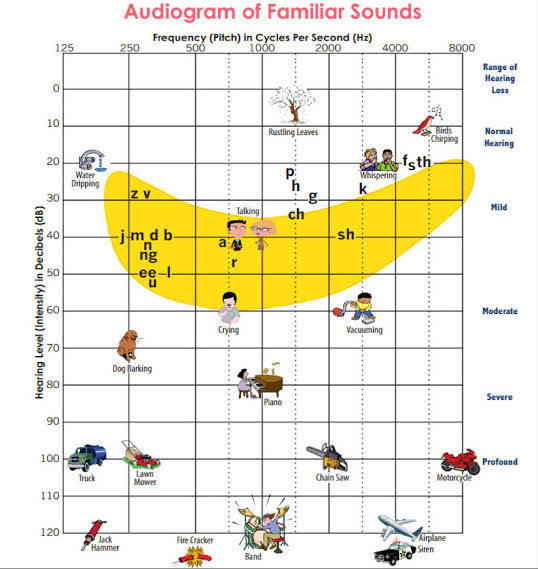
Other than severity, hearing loss is also categorized in 3 main types: conductive, sensorineural and mixed (the latter being a combination of conductive and sensorineural).
Conductive hearing loss: the sound doesn’t reach the cochlea (the inner ear). The causes can be infections, a damaged eardrum, malformations, impacted earwax among others.
Sensorineural hearing loss: dysfunction of the inner ear. The sound is able to reach the cochlea, but isn't handled properly. The most common cause is the destruction of the hair cells in the cochlea.
There is another auditory disability that isn't exactly hearing loss but hinders one's ability to understand sounds: auditory processing disorder. People with APD have normal hearing and no damage to the inner ear, but the sound isn't processed properly by the brain.
I'm keeping this short, but the corresponding Wikipedia pages are quite exhaustive, with statistics and all.
How to tell if one is deaf or hard of hearing (HOH)?
Well, it's actually complicated and depends on the person. I've noticed everyone has their own definition of deaf and HOH. According to some people, only people with profound to total hearing loss should be called deaf. Medically, it seems that people with severe hearing loss can also be considered deaf. I've seen people say that you have to be born deaf to call yourself so. And I guess that among hearing people, many think deaf people are simply the ones communicating in sign language.
And there's my personal take: you call yourself what you feel best describes your hearing abilities and problems. I feel that if hearing loss severely hinders your social and professional life, you may call yourself deaf. The degree of your loss doesn't matter that much if you feel isolated by your disability.
And to hearing people: you don't get to have a say if one is deaf or HOH. Period.
What are hearing aids?
There are actually 2 kinds of hearing devices: hearing aids and cochlear implants.
Hearing aids:
They improve hearing by making sounds audible, for example by amplification. Their settings are custom-made for the wearer by an audiologist. They come in all shapes and sizes but there are 2 main families: Behind the ear (BTE) and In the ear (ITE) hearing aids. The former are composed of a case attached to an earpiece that fits inside the ear. The case rests behind the ear and contains the electronics, controls, battery, and microphone, while the loudspeaker, or receiver, may be housed either in the case or in the earpiece These are particularly recommended for more severe hearing losses, but they're very versatile. In the ear hearing aids devices fit completely in the ear bowl (no case behind the ear) and are more discrete. They're usually recommended for mild to some severe hearing losses
Hearing aids can't completely correct hearing loss. Sensorineural hearing loss reduces the sensitivity to sound and aids can only partially compensate by amplifying sounds. Conductive hearing losses tend to be better treated by hearing aids; the amplified sound is able to reach the cochlea, and the signals are transmitted normally to the brain.
Cochlear implants:
You know how I said sensorineural hearing loss was generally caused by the destruction of hair cells inside the cochlea? These hair cells are sensory receptors that trigger nerve signals when detecting sound waves. The cochlea then converts those sound waves into electric signals that travel to the brain through the auditory nerve. So with damaged hair cells, the signals can't properly reach the brain and the information will be incomplete.
A cochlear implant bypasses the outer, middle and inner ear and generates the electric signals. It doesn't produce noise and unlike hearing aids, it doesn't amplify it. The outer part is composed of a microphone, a sound processor and a coil. The mic takes in sound, then passes it to the processor that crunches the data into electric signals called "channels", which correspond to different sound frequencies. The data is transmitted to the coil, placed on the scalp. The signals are then transmitted as wireless signals to a receiver and electrode array surgically implanted into the cochlea. The receiver converts the waves into electric impulses and when the signals reach the electrodes, they trigger the hearing nerve connected to the brain.

(source: Blausen.com staff, 2014)
What an implanted person hears is what the brain interprets from the combination of these signals. The limited number of channels in a cochlear implant means the sounds are very different from natural hearing and it is necessary to teach the brain to hear after the surgery. It typically takes months of auditory training. The implant doesn't replace hair cells and can't relay pitch and timbre. Implantation is also irreversible. But it allows people with a very low level of hearing to hear speech and pick up different types of sound. When one doesn’t benefit enough from hearing aids, it’s often the last alternative.
It is believed that implanting congenitally deaf children at a young age gives better results, but this is a very controversial topic and I'll get back to it later.
In France, hearing aids are expensive and cochlear implants even more so, but partially reimbursed (fully for children) by social security.
Are deaf people mute?
It’s a common misconception. When you have hearing loss, your vocal cords aren’t impacted. Deaf people can speak, and some really well; they sometimes just choose not to because it can be difficult to regulate volume and pitch. Some deaf people get discriminated for their accent.
So please, ditch the word deaf mute (”sourd-muet” in French).
Can deaf people listen to music?
Yes, but not with the same accuracy. People with profound to total hearing loss will mostly feel the beat and vibrations. There are backpacks and vibrating floors specifically designed for this purpose. People with hearing aids can link them to their music devices with Bluetooth or just wear headphones. The only exception, I believe, is cochlear implants. As they can’t relay pitch and timbre, music isn’t perceived as accurately. It gets better once the ear is trained.
By the way, try to be mindful with deaf people about music and don't imply we miss out on something great. Some don't care, some are perfectly content with what little they can hear and feel. And those who lost their hearing later in life don't need reminding.
How do you manage in your daily life with hearing loss?
Firstly, I would like to stress that most of the issues faced by deaf and hard-of-hearing people are social, not medical, we don’t usually suffer physically from our condition.
Regarding adjustment, it's different for everyone. How the person copes depends on lots of factors, including early vs. late hearing loss, gradual vs. sudden, as well as the severity, the communication needs and the personality (acceptance vs. aversion to change). Hearing loss is also linked to feelings of depression, anxiety, frustration, social isolation and fatigue.
Hearing loss hinders access to education and job opportunities due to impaired communication. In France, the unemployment rate of people with severe hearing loss is almost 4 times the national average. There are extremely few universities which offer proper higher education in sign language. Much of the available higher education adapted to the deaf and hard-of-hearing is short-termed and still very oriented towards manual jobs. And it's not necessarily easier for mainstreamed oralist deaf/hard-of-hearing people who attend universities. As a consequence, deaf people have lower levels of education, with only 10% getting a higher education diploma compared to 30% of the general population.
Access to services, infrastructure and culture is also still a problem. A very important law was passed in France in 2005 in favor of people with disabilities. It guaranteed, among other things, access to all areas of social life: education, employment, housing, transportation and culture. But progress has been very slow. In France, in 2020 for instance, it's next to impossible to find French movies with French captions in cinemas. However, almost all foreign productions in theaters here are available in their original version with French subtitles. Close captions are subtitles specifically designed for the deaf and hard-of-hearing. They supplement the dialog with all the other audio cues: ringtones, music, languages, and so on. They're also more expensive and there are few sessions offering them. Regarding telecommunications, we had to wait until October 2018 for a national telecommunications relay service that allows us to make phone calls with communications operators (FSL interpreters) and speech recognition.
Social integration is extremely important to our well-being. A lack of accessibility may be the cause of a drop in self-esteem and confidence, as well as social withdrawal. Hearing loss has been linked to Alzheimer's disease and dementia, especially among isolated individuals. Prejudice and discrimination are also a problem, probably more towards signing deaf people because both “slurred” speech and the inability to speak are perceived as alien.
Look, lack of accessibility is a pain, but it really shouldn’t prevent us from living our lives to the fullest. The important thing is to not stay alone, even though it's sometimes easier said than done. There is a lot of systemic pressure to make hearing loss invisible. Invisibility is even a selling point for hearing aids, while implanting children at an early age is encouraged to raise them in the hearing world… Many HOH people don't get access to the community simply because they don't know it exists!
Do you have to learn sign language when you become deaf?
No, you don't have to. The later you become deaf, the more you'll tend to continue using speech. But in my opinion, it's worth considering learning sign language for people with acquired hearing loss, especially children, even if they are fitted with hearing aids. Why? Because hearing aids can't do everything and their performance is very limited in noisy environments. It's great to have another ace up your sleeve to communicate. Also, and it's my personal experience, it's comforting to be in touch with the deaf community and people who share your joys and problems alike.
This is a very sensitive and controversial topic within the Deaf community, which is why I choose to give my opinion on acquired and not prelingual hearing loss. Prelingual hearing loss refers to people who were born deaf or became deaf in their infancy, before the acquisition of language. It means parents must choose how they will educate their children, if they will have them fitted with hearing aids or implanted, follow a mainstream education or go to a deaf school…
Deaf and hard-of-hearing people may also use cued speech (”Langue Parlée Complétée” or “LPC” in French). Cued speech is a visual rendering of spoken words. Some phonemes like "t" and "d" or "p" and "b" can't be differentiated when reading lips (which deaf and HOH people often do automatically). Cued speech renders all phonemes visible through handshapes, known as cues. They are 8 handshapes to represent consonants and 5 positions around the face to represent vowels. Associating one handshape with one position will cue a whole syllable.
Why is there a Deaf culture? What does it entail?
Now, it gets complicated. And fascinating. I won't dwell too much on the subject because I'm basically a baby Deaf gal and I'm not qualified. But my ask box is open if you would like to chime in.
From the moment people share a language and a history, they'll also share a set of experiences and issues, values, good practices, and basically a mindset. So naturally, with sign language being a real language, taught from generation to generation - as well as surviving a century-long ban from schools in France - a whole culture emerged.
And I should even say cultures… every country has its own Deaf culture because it's also tightly connected to the host country's culture and local sign language. The word "house" isn't signed the same way in French and Chinese sign language for instance because architecture isn't the same.
Deaf culture is very militant as Deaf people don't think of hearing loss as a disability. Deaf people typically don't speak of hearing loss but of "Deaf gain". I mentioned that there is systemic pressure to make hearing loss disappear. For instance by implanting deaf children at a young age to teach them to speak and integrate them into the hearing community. Deaf people see this as the death of their culture and language. For many people with hearing loss, Deaf culture means comfort, pride and community. From the Deaf perspective, hearing societies often fail to understand Deaf people's abilities and culture. From this point of view, the lack of communication stems as much from the inability of most hearing people to use sign language as from deaf people's inability to hear.
Deaf culture is however an open culture, you can join at any point in your life, you don't need to be born into it. It usually starts when you learn sign language and get acquainted to other d/Deaf people. A lot of people with late hearing loss are unaware such a culture exists and it often results in a lower self-esteem, as they don't find support in the hearing world. Some hearing people, especially relatives who learned sign language or interpreters, may be considered part of the Deaf community.
I'm not enough of an expert to write a full paragraph on the subject, but just know that just as in any culture, the arts are also very important in Deaf culture, especially visual performances, like drama and sign singing (chansigne in French).
For instance:
youtube
youtube
Where can you learn sign language in France? Where can you practice? Do you have any online resources?
First things first, sign language isn't universal. There are almost as many sign languages as countries in the world, though some are more closely related than others. American Sign Language (ASL) and British Sign Language (BSL) differ widely as they use different basic signing systems. There is something called International Sign Language (ISL), but it is only used when Deaf people from different cultures meet, for instance during international competitions.
Regarding French Sign Language (FSL), there are a lot of organizations and associations which offer lessons such as l'Académie de la Langue des Signes Française, International Visual Theatre, 2LPE, Visuel-LSF, etc. Unfortunately, many (especially cultural ones) are located in Paris, and more sparsely in big cities like Lyon or Toulouse. If you're lucky, some high schools offer sign language as a third language, which allows you to gain extra credit for your baccalauréat.
Learning French Sign Language is very expensive, around 220€ for 30 hours. Financing for sign language can be hard to find and there are hardly any discounts or reimbursement schemes for people with hearing loss. Obviously, you may learn sign language through less expensive options, such as meetings at Cafés signes, which are small gatherings in a bar and welcome hearing people as well as deaf and HOH people. It's best to know at least the basics and to avoid Signed French (sign language has a different syntax) and several Cafés are limited to people with a certain level, but several associations like La Parole aux Sourds welcome everyone.
Some libraries in Paris have a dedicated section for sign language and Deaf culture such as Bibliothèque Louise Walser-Gaillard (next to the International Visual Theatre), Bibliothèque Saint-Eloi, La Canopée, Bibliothèque André Malraux and Bibliothèque Fessart. Books are great and may include a lot of signs, but they don't render movements very well.
There are plenty of online resources. I personally use Elix when I need to find a sign. It's a participative dictionary and still a work in progress, so all signs aren't referenced. What I find nice is that they provide variations of the same word. For instance, the word "mom" has a lot of “synonym” signs, depending on the area you live in.
Youtubers are an option BUT make sure you choose channels managed by a member of the Deaf community, a certified teacher and not a student learning sign language. It's important. I like Mélanie Lemaistre who has 2 channels. Her main one is MélanieDeaf, where she raises awareness on culture and sign language. On Signe2mains, she teaches a lot of vocabulary. You may also be interested in Lucas Wild's videos in which he signs and provides captions. It's good for training. And finally, I discovered this channel when typing this post and found it really, really good. It teaches idiomatic expressions in FSL.
But the most important thing when you want to learn sign language, like any living language, is to meet actual deaf people to practice. You have to learn to express yourself with your body and your face, and it's not easy for everyone. When you take lessons, the first hours are usually dedicated to mimes. Sign language is different than mimes as the frame is limited to your upper body but you still need to work on it at first. Signing people typically don't appreciate when you finger spell a word to learn its sign, it's more respectful to mime it.
Where can I meet Deaf people and learn more about their culture?
You may learn more about Deaf history and culture during Open Door Days, when organizations like the INJS (Institut National des Jeunes Sourds, one of the oldest schools for the d/Deaf in Paris) organize guided tours.
In Paris, there is also an amazing center called International Visual Theatre, which is dedicated to visual arts. I take sign language lessons there (they're excellent) and often go and see their plays, which are in both French and FSL.
Every two years, the city of Reims holds a huge international Deaf culture festival named Clin d'Oeil. Thousands of d/Deaf people come from all around the world to meet during 3-4 days (usually in July). It’s dedicated to sign language and visual arts: drama, dance, sign singing (chansigne in French), cinema, mimes, street performances… The next edition will be held in 2021.
Deaf people also organize gatherings, for instance during the World Day of the Deaf, every year in September, when we march for our rights.
Regarding the media, France Télévisions has a program called "L'Œil et la Main". It's in FSL and subtitled in French. They address current news (#MeToo, Youtubers, gene therapy, etc.) from a deaf perspective. There's also a news website entirely designed for signing deaf people called Media'Pi. In FSL, "Pi" means everything that's typical or related to a situation or a person and there's no exact translation in French. If you understand French, this subtitled video explains what "Pi" means.
Do you have any movies, series, books, etc. to recommend?
To be perfectly honest, I have yet to find entertainment media about deafness and hearing loss that I like. But I do like when movies or series include deaf characters and d/Deaf actors into their ensemble. I haven't watched Switched at Birth, but I liked Sean Berdy in what I've seen of The Society so far. There's another young deaf actress, Millicent Simmonds, who was recently in 2 movies: A Quiet Place and Wonderstruck (I'd like to see the latter one). Marvel's The Eternals will also feature the first deaf superhero, played by Lauren Ridloff. But none of them really address deafness and Deaf culture. Which is also totally valid, it's nice to have characters where aren't defined by their disability. It's just that yes, sign language is nice, aesthetic through the roof, but what about the culture?
I didn't like Children of a Lesser God (a movie based on a play), which is supposedly one of the most famous representation of deaf people in movies. I think it didn't age well. But it made Marlee Matlin famous and allowed her to talk about Deaf issues and to give the community visibility. It's a must-see, basically, but you might not enjoy it.
In France, we have hardly any representation in the mainstream media, which is why I have high hopes about Skam France and I hope I can soon add it to the list. I however recommend this documentary: J'avancerai vers toi avec les yeux d'un sourd, which the director dedicated to the friend who had taught her sign language and who sadly passed. I don't think this was distributed in English but I could be wrong! There's also Marie Heurtin, a movie about a young deafblind girl who is sent to a convent, where Sister Sainte-Marguerite decides to take care of her.
The only popular movie with deaf characters that came out in theatres recently in our country was La Famille Bélier. It's quite infamous within the Deaf community as hearing actors who were specially trained in FSL for the movie played two out of the three main deaf characters. We're used to having our roles played by hearing actors, the same happened to the recent theatre production of Children of a Lesser God where two hearies played the main characters.
I know that many people think cinema and drama are all about the performance and that it's ok when hearing people play minority roles. It's not. Have you ever seen a deaf actor play a hearing character?
I'm short on fiction works about hearing loss and Deaf culture though; feel free to chime in if you have recs. In France, Emmanuel Laborit, a French Deaf icon who won a Molière in the 90s for her performance as Sarah Norman (the main character of Children of a Lesser God), wrote an autobiography, le Cri de la Mouette where she addresses her childhood memories and the shaping of her identity though sign language.
What would help d/Deaf people?
First and foremost: visibility! Let d/Deaf people speak for themselves, demand from production companies that they cast deaf people for deaf roles. If you are not seen, you are not known. Invisibility plays a big role in the negative perception hearing people have of hearing loss. I've seen people here saying that becoming deaf was their worst fear in the world. How sad.
Many people with hearing loss will spend their whole life with it. We have a long road before us and we don't want to fight it through. Give us positive representation, people to admire and to support. Give us good stories. Giving us visibility will also shine a light on our issues and our needs regarding accessibility. Keep that in mind and be proactive. You don't realize how tiring it is, when you are deaf, to organize your own accessibility at an event because nobody thought about it. Equal opportunities don't mean you have to treat us like you would treat abled people and just let us be (you know we are already aware we have the right to exist?). It means giving us the tools we need to thrive because we start with a pretty big impediment.
Don't let deaf people bear the brunt of the lack of communication, especially if they choose not to talk. You wouldn't do it with a foreigner. Use voice recognition or type your sentence on your smartphone, use mimes, but just try. A conversation goes both ways and we are the disabled ones, not you.
So that's it. That's the post. If you have questions, I beg you to ask them, my ask box will ALWAYS be open for his purpose. I had to keep this as short as possible and left many things aside, but I hope this will give you a good insight into hearing loss and the d/Deaf world.
#many thanks to my boyfriend for reviewing this#ilu honey#and many thanks to Gaëlle for explaining how this goddamn site works#Manon rambles
188 notes
·
View notes
Text
Hello tumblr,
Boy, it’s been a moment or two. I haven’t left tumblr by any means really in the last year and a half, but it became less a part of my life when I moved to Portland two years ago and got involved with people and had a social life there for awhile and a love life and now I am 30. I started tumblr at 22. I was so much more naive. I’m sorry to all the folks who wanted to keep reading my life story. I do swear that I will get back to it someday, but even rereading it I see things I left out and perspectives I forced on my audience when I could have left the truth more open. I don’t stand by some of the values I had even two years ago.It’s not bad, but I feel like it needs to be gone over. It’s been suggested by people that I shouldn’t do that, but I have a strong sense that I know what I should do.
I’ve been feeling the weight of time and limitations of health both mental and physical, financial and just the circumstances of living in an environmentally unsustainable late stage capitalism position where I can bank on nothing and so much is up in the air. And I know I’m still young, but not that young anymore. I missed out on a lot in my twenties and I know I won’t get a lot of that back. And I don’t feel like I can plan ahead. I feel very trapped, enormously lonely and isolated. I know it’s eating at me all the time, but I feel like acknowledging it (as I am ironically doing it now), makes It bigger and more painful. But it’s getting to the point where I have nothing to lose.
I’m in a situation where I have troubled friendships. People who love me and I love them but there are several reasons we can’t be close. I look at the way the world is headed and I have this lack of enthusiasm in me because I feel like people are going to get more isolated and more unhappy and feel empty and deterministically realistic about the lack of prospects of what they can look forward to, I feel like everything is getting unstable and worse. And nobody wants to talk about it, to inspect it or even laugh about it. I see growing trends of fascism, a sense of withdrawing in ones self and into technology that everyone I know is guilty of, myself definitely included, the commodification or gentrification of acts of rebellion or individualist acts that one can take to protest the status quo through art or media. There seems to be no valid way to stop the way the world is headed or what people are doing collectively, or ultimately how to even demonize all but a select few. And even them, as shitty as it is to say, the same rules of the universe that created trees also created Jeff Bezos.
I feel like hedonism gets misunderstood. I consider myself to be a hedonist and I’ve been holding out for a future of excitement or sense of euphoria or positive paradigm shift for about a year now. It started when I lost my job last year, and Went through a semi abusive relationship that left me emotionally drained. I feel like after that I kept getting on my horse and falling off two weeks later. It’s gotten to the point where I am afraid to lie to myself when I do have minor breakthroughs that I am even improving.
Poverty also got the best of me. I’ve gone through a series of setback after setback and it’s prevented me from even acquiring the sense of relief or letting go or growth even to take on or form enthusiasm about even making myself happy and there is a despair in me beginning to grow that says this is just the way things are now. It’s like I’m just surviving for no reason. I have nothing to offer anyone. I’m also surrounded by people who are very depressed, probably more unhappy than me in some ways, so I’m not about to get any light at the end of the tunnel talk from a friend. I have no doubt that a strong sense of support would probably make worlds of difference but that’s not in the cards right now. Reaching out in my situation would probably cause other people’s misery or misguided outlook on life to rub off on me further. And for that I unfortunately have to put up my walls because I know myself and the chameleon aspects of my personality and other people’s negative coping mechanisms rub off on me.
And see, like on top of all that, COVID hit and that donked up my plans at maybe getting a new job or meeting new people. All the things I could do to reinforce positive new things into my life became impossible. I shut down after coronavirus happened and fell back on some of my old bad habits, which were reinforced by literally the whole world shutting down. I couldn’t fight it if I wanted to, I was living in isolation and frustration and insecurity and even looking around and worrying about all the people who are worse off than me and will be even worse off once their benefits go away or housing is taken makes me sick to my stomach. I’m afraid I am just gonna have to tread some kind of postmodern Great Depression and give up on living my best life.
Something got messed up with my unemployment and it’s been six months and though I claim every week, I don’t have access to any of that money yet and still have to call people constantly to try to correct it. I have over fifteen thousand dollars that I can’t gain access to. I just lost my food stamp benefits. I work eight hours a week which basically just keeps my phone on, and other than that I’ve been making it on no money. I don’t see eye to eye with my roommates, though it’s not personal and nobody really checks up on me. I wonder why sometimes that I am doing anything. What use is it to hope for things that become more and more impossible? And why tread water when I feel like I have no goal I can aim towards? As soon as I get used to the way things are, something new happens that is out of my control, and I am back to square one. I feel like I am shutting down.
Anyway, I am trying to hold out for something better, but more in a sense that I am trying to maintain something. I do have experience with feeling hopeless and empty from my early and mid twenties, which isn’t good but in a way I know that when I moved to Portland I got a beautiful awakening of a life more realized and full and in some way that was so unexpected that, not to sound super cheesy but, it was kind of a second birth for me, and if I was in the muck before and got out, perhaps I can do it again.
I guess I’m back on tumblr with a little more frequency for that very reason. I’m lonely and lost and trapped. Maybe I will do more writing on here and see where that goes. I feel like I could break things down further and get a better grasp of myself if I wrote more. So maybe I will write on here tomorrow. Meh..Who knows? I feel like if I broke my ideas down into topics I could exemplify something or find a deeper truth in the details.
Lastly, and this is semi unrelated but, I’ve been mutual with some of the people on this site for seven years and it trips me out when the notifications say so-and-so likes your post and its been seven years. I am not gonna lie, it is really cool. It kind of makes me feel like tumblr is still kind of a form of ‘home’ to me.
20 notes
·
View notes
Note
hussie said a thing abt the epilogues reddit. com/r/homestuck/comments/cuywff/the_homestuck_epilogues_bridges_and_offramps_new/
I also think many of the negative feelings the story creates isn’t just an urgent prompt for the reader to imagine different ideas, or ways to resolve the new narrative dilemmas. It’s also an opportunity for people to discuss any of the difficult content critically, and for fandom in general to continue developing the tools for processing the negative emotions art can generate. Sorting that out has to be a communal experience, and it’s an important part of the cycle between creating and criticizing art. I think not only can creators develop their skills to create better things by practicing and taking certain risks, fandom is something which can develop better skills as well. Skills like critical discussion, dealing constructively with negative feelings resulting from the media they consume, interacting with each other in more meaningful ways, and trying to understand different points of view outside of the factions within fandom that can become very hardened over time. Fandoms everywhere tend to get bad reputations for various reasons, maybe justifiably. But I don’t see why it can’t be an objective to try to improve fandom, just as creators can improve their work. And I think this can only happen if now and then fandoms are seriously challenged, by being encouraged to think about complex ideas, and made to feel difficult emotions. I believe when art creates certain kinds of negative feelings in people, it can lead to some of the most transformative experiences art has to offer. But it helps to be receptive to this idea for these experiences to have a positive net effect on your life, and your relationship with art.
Christ, he’s gone full Lennon. Imagine a good ending. I wonder if you can.
So, I’ve mentioned this a few times, but the most transformative art has ever been for me was a comic that actually started on the Homestuck forums
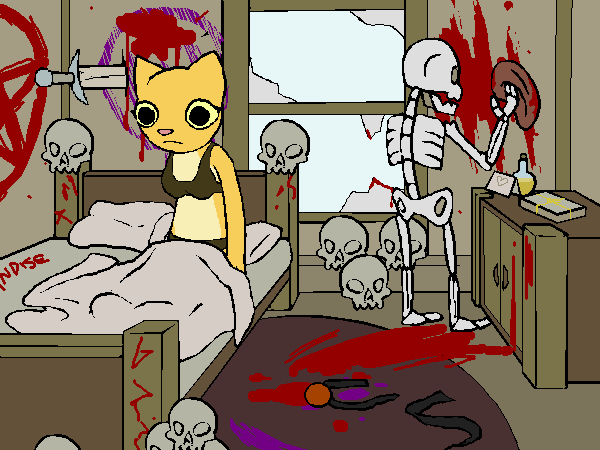
Prequel - Or - Making The Cat Cry: The Adventure - is a comic written by Kazared loosely based on the Elder Scrolls IV: Oblivion. It’s about a Khajiit girl named Katia who moves to OblivionLand to make a new life for herself, and the comic spent years building Katia up to bigger and bigger heights so that every time she crashed she crashed harder than ever before. The second time she relapses into alcoholism is where a lot of readers give up on the comic for being misery porn.
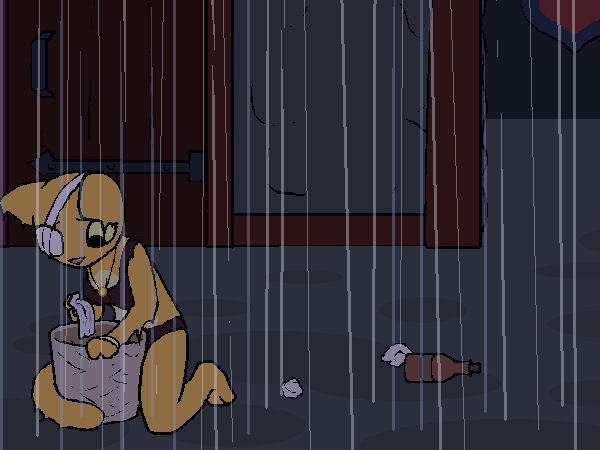
There’s a point where she she’s solved all her problems and even gets to join the mages guild - her lifelong dream - only for the woman running the Kvatch mage guild to mild control her into giving up all her stuff, including the stuff important to Katia’s only friend. Katia is left naked on the streets literally digging through trash in the vain hope of trying to find a solution to at least one of her problems. And what she finds is a bottle of beer.
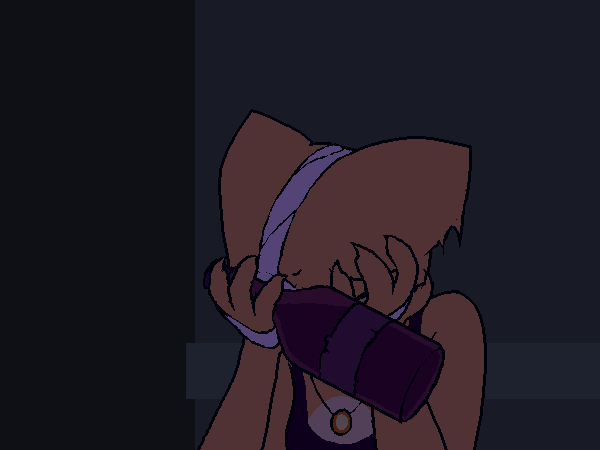
Twice already in this comic Katia hit a really bad patch and started drinking again. The comic has twice made us root for Katia to succeed, only to jump cut to her waking up in a stranger’s bed with no memory of what happened.
She wanders into an empty church (OBVIOUS SYMBOLISM ALERT), and alternates between trying to find some supplies and fantasizing about everything magically getting fixed, which slowly morphs into fantasizing about drinking while getting increasingly furious at barrels for not having clothes in them.
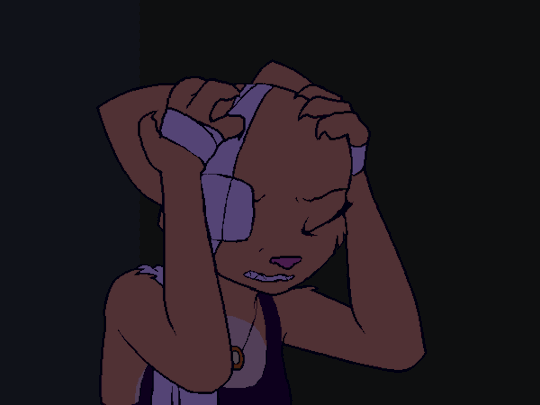
One thing. You wanted one thing and you were too much of a fucking idiot to realize it was hopeless and pointless and bound to ruin everything. Stuck on some childish idea that you could be anything, do anything, and just be some selfish bitch that’s never happy with what she has. Fuck, you don’t even know what you’re mad at anymore, you just hate yourself and everything you ever ruined for yourself and everyone and want to stop thinking about what a worthless mindless thoughtless imbecile you are. You just want to stop fucking thinking about it.
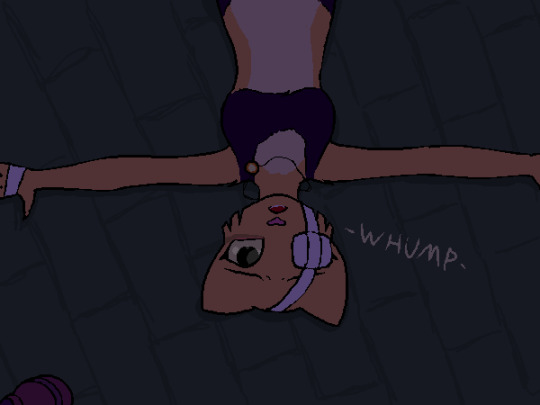
You drop onto the chapel floor and just cry. You cry and cry because you’re stupid and easy and can’t fix anything no matter how hard you try. You cry because your best is worse than everyone else’s average. You cry because your parents never loved you and you’re a disappointment to everyone, even yourself. You cry because all you wanted was to be someone and that’s never going to happen. And when that’s done, you cry a little more because you’re ashamed of being such a crybaby.
You try to get all the emotions out, try to clear your mind and maybe, just maybe feel ready to tackle the night ahead of you, feel as though this is the time you finally turn things around. But no matter how hard you try, how hard you weep and bawl and try to get it all out, you’re still just a fuckup. No matter what you try, that knowledge is still there, gripping onto your every thought and reminding you that things are never going to change.
You’re not strong. You’re not a hero. You’re not even worthy of the name Katia Managan. You’re sad and angry and nothing makes sense, but you know this is probably the clearest your head is going to get.
Someday, things are going to get better. Someday, you are going to fight and persevere and everything will feel great. You think.But for now, you know what you have to do.
And at the very least, there is no way you could possibly make yourself feel any worse.
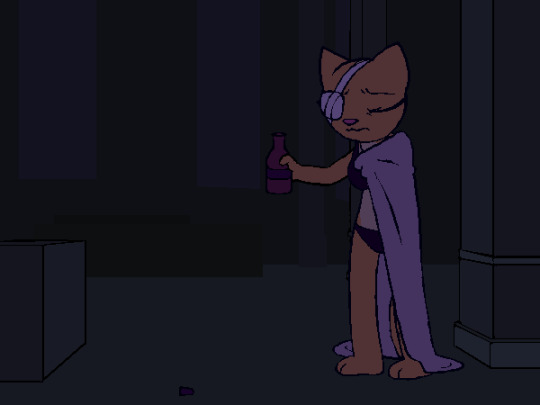
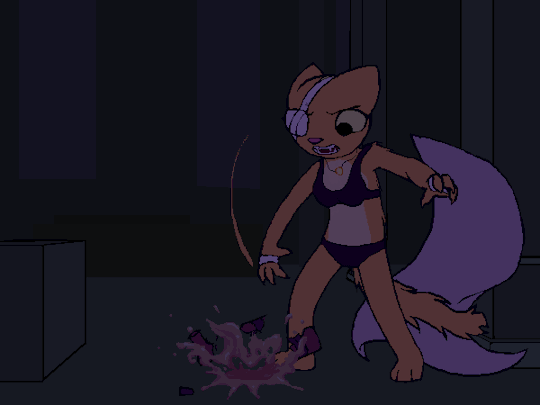
Katia, for the first time, manages to avoid drowning drinking. She overcomes her issues. And you know what happens next?
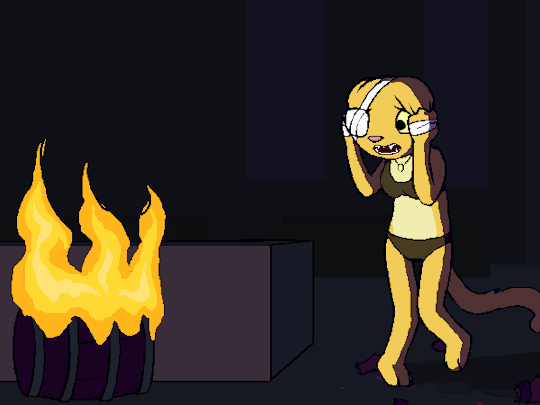
She accidentally sets the church on fire, because this is still Prequel. She passes out from smoke inhalation, and then there’s….
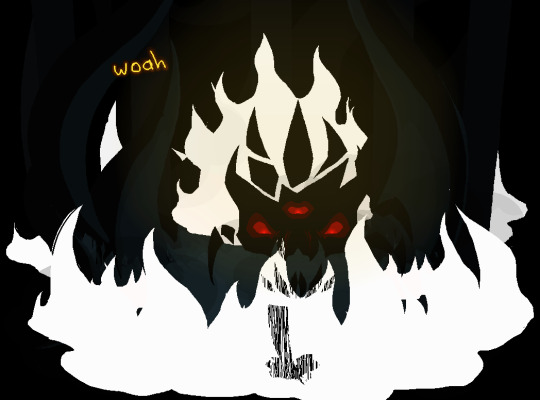
this, and then she wakes up and reflects on her managing to stay on the wagon.
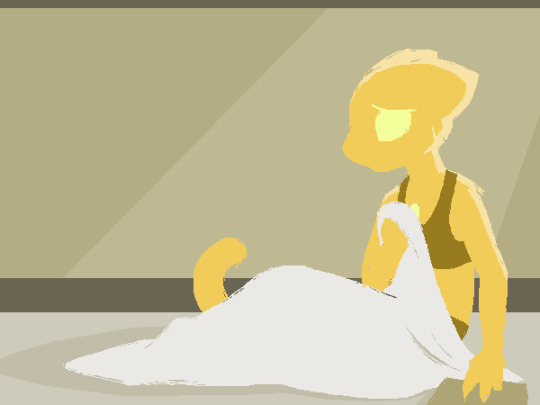
Honestly, you just feel… kind of numb.
You fucked up. You lost everything you earned, were discarded by the people you looked up to most, gave away the package you were supposed to be delivering to pay your friend back, completely lost control of your powers, and after passing out naked in a church have probably ruined any chance you might have had at a good reputation in Kvatch. You were a wreck last night when this was all happening, but now… you guess it just feels like you’ve run out of sad. You’re just confused.
Personally, I think this stuff is way darker than anything that happens in the Homestuck Epilogues, which is mostly just over-the-top Warhammer 40k grimderp. This shit got to me, man. And around the time this is happening in the comic, I lost my job. And as the storyline continued past this point, I kept applying for jobs and getting turned down, and it started to really wear on me, I felt I had no useful skills, since my old job was supporting software that only that company used because they made it. Much like Katia got into great positions only to fail, I walked out of interviews thinking I’d aced it only to get turned down, while Katia kept making two-steps-forward-one-step-back advances and not really getting any closer to solving any of her issues. And one day, about six weeks into joblessless and starting to get into serious depression over it, I got two “Thanks but no thanks” calls from places I was feeling good about back to back, and I was just done. 10am and I was going to go into my room and lie down on the floor all day but first Prequel updated so I guess I’ll check it real quick oh hey a flash
youtube
This puzzle took me like 20 tries, I’m no good at them. Aggy ran out of inspiring dialogue and started looping. And if you’re not in the right mindset, in the right place, this probably doesn’t seem like much. But right there, a month and a half into unemployment, doing that stupid fucking jumping jumpy peg thing while a ghost cheered me on was life-changing. I was so fucking jazzed when I got it, I was fired up! I was so fired up I tabled my “lie on the floor all day in despair” plan, and started applying for a bunch of jobs. A few of those jobs called me back. One hired me. I still work there now. I always liked webcomics but Aggy Extrapolate is the reason I make them. Because good art is powerful. Good art changes lives, maybe even saves them. And it doesn’t need to be happy to do it, Katia still hasn’t succeeded at her goals (in part because Prequel updates at a rate Dresden Codak would make fun of).
What the hell did the Homestuck Epilogues do, by comparison? What’s the positive net effect on my life, or my interaction with art? “Sometimes things you like are bad”? Shit, man, I already knew that, I’m into wrestling. How is “John recognizes Terezi’s jizz on his dad’s car” supposed to make me a better person, exactly? Do you really think the problem with fandoms is that they’re not angry enough? Are you high, Andrew Hussie?
#Homestuck#Prequel#Prequel Adventure#Also Drop Out was a million times better than the epilogues while also being a million times darker#Anonymous
261 notes
·
View notes
Text
Oyasumi Punpun, a Bittersweet Introduction to Chaos
Everyone of us had the feeling of pain because a broken heart, the sadness of a close friend who must depart or maybe not living up the expectation of other people. Oyasumi Punpun represents magnificently all of that problems.
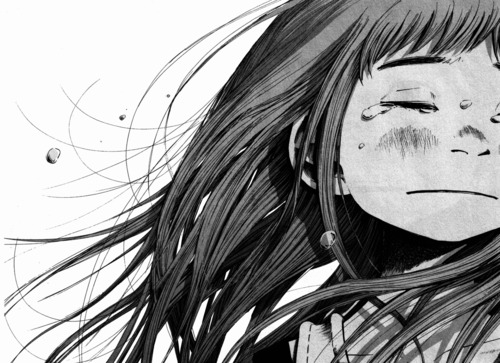
Oyasumi Punpun it’s a work of Asano Inio, author of some other realistic novels, like “Solanin” or “The Girl of the Shore.
In this history, we follow the live of Onodera Punpun, from his childhood to his young adulty. Punpun is (at the start) represented by a little bird, but in his world he is a normal human. We follow his journey, dealing with the many challenges life throws at him, including oncoming adolescence, domestic issues and budding romances.
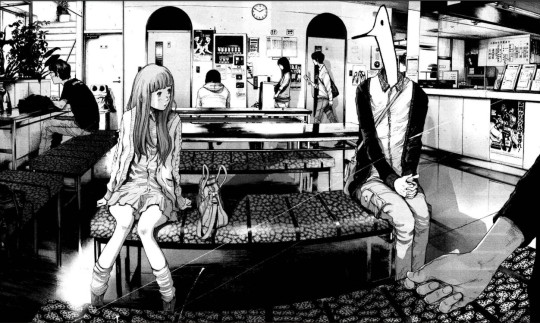
As life becomes a burden, Punpun’s journey shifts between bouts of hope, and clouds of darkness from the innocent ignorance and curiosity of his childhood, sexual frustration and discovery in his teen years,chasing a long lost love, crippling depression and numbness in unemployment, just so many things that add up to a sad existence. The only difference was, Punpun made a lot more wrong decisions in his life, and it was spiral that never stopped spinning down.
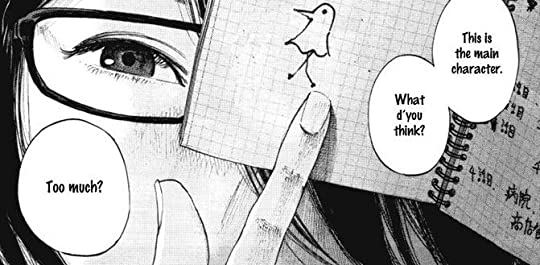
Very early in, we become aware that this coming of age story is much different in its exploration of issues. Most manga in this genre explore issues on a surface level, focusing more on school relationships and budding romances. Punpun, however, deals with incredibly serious themes from a very young age, including domestic abuse, divorce and neglect. Our perception is skewed due to the abstract way that these events are being depicted, much like how a troubled, naive young boy may see the world around him.
However we also meet the people that surrounds Punpun, which everyone has his own problems. We meet a childhood friend of Punpun, Seki, who in my opinion is one of the three protagonists of the histori, Seki is a stubborn boy who thinks he understand society but in the end he has no clue, we follow his path to accept his best friend, Shimizu, which is a pretty special guy that his way of being faces Seki’s one.
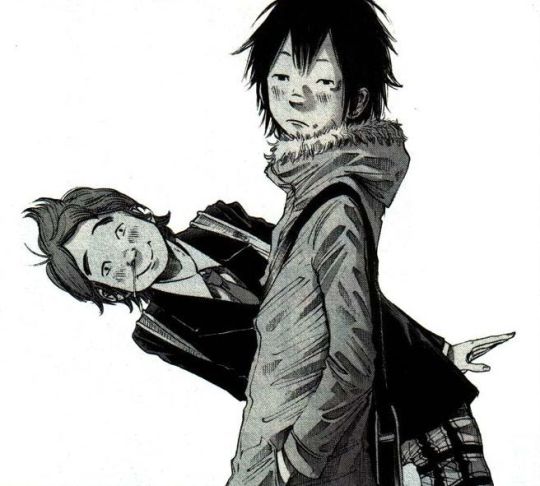
But I mentioned Seki as one of the three protagonists, so, who is the other, and how is it related to Punpun? Well, his name is Pegasus, he is an adult who never interacts with Punpun, and for sake of not spoiling I won’t say more than that.
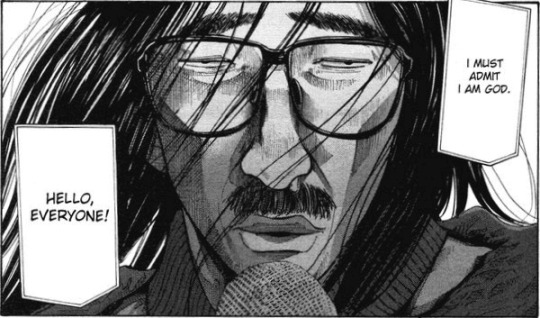
The moral dilemmas in this work are everyday’s bread, Punpun faces though decisions in every point of his life and when he doesn’t know what to do, he ask for help to god.
Yes, to God, Punpun’s uncle taught him a chant to call god, wich it’s representated as a man with afro and glasses. But in the end the God of Punpun is nothing more than his conscience, looking for a exuse to act with a selfish behavior.
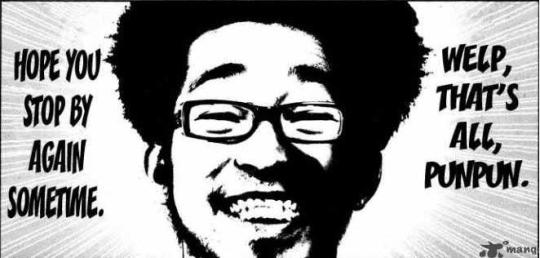
I absolutely recommend this manga to everyone of you, as a reader it’s impossible to not feeling identified to Punpun or another character, it’s really my favourite manga. My only warning is that if you’re currently in a bad spot in your life, you must not read this manga. It is a story that keep hitting you with stuff. As a matter of fact, it punches you with a running start and then doesn’t stop punching. Couple that with a surreal and yet at the same time very realistic art style, and it is a great manga from start to finish. Also another thing, took your time to read it.
That’s all.
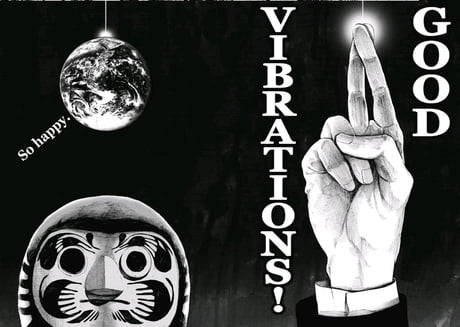
(yes, this is an image of a page on the manga)
Tomás Chávez Vega
9 notes
·
View notes
Text
The Porn is Gone. I am Not. Yet.
3 million dollars is a steal, yet you cannot deny the death of a platform.
Taking notes from historical context, I might as well use this time of self isolation to catch up on things, including touching bases on people that feel out of place in time of crisis. In terms of economics, America will be rocked beyond repair. We’re talking about years of re-balancing unemployment, housing and medical care for those displaced from the virus and the rise of off-site businesses. There’s some good news at the end of the tunnel.
Unfortunately, it’s mostly bad news.
While the media and politicians may downplay what the virus actually does to a person, make no mistake, a virus doesn’t care about your age. The misconception of this nationwide lock down is far worst than most of you may imagine. Shutting down an entire country for a month or so will bring financial ruin to most Americans. Unless you’re already considered an essential business, many of those graduating from college will find themselves somewhat screwed when it comes to the job market as well.
The disruption the virus will cause will be unlike anyone has seen since WWI and WWII in terms of economic crisis. Unlike back then, there’s no way China (CCP) will help pay for the damage they have caused by with holding evidence of the virus since November of 2019. Even as to blame an American soldier for the initial outbreak. There’s no way for America to rebound immediately after WWII either. We’re looking at a potential shift of a global super power switched over to China, especially seeing how protective American media has covered for the CCP and how they will quickly recover from the rest of the world.
No amount of money will help solve the long term effects of a month long or more (more than likely) shut down of America. Unless everyone (including utility companies, banks, etc) are willing to financially freeze everything, expect to see a recession never seen since the Great Depression. The ones that will make it out as winners during this time of crisis will be obviously those invested in hospitals, pharma companies, etc.
Now I will briefly go over the virus, which has many names. The Chinese Virus, Corona Virus, Wuhan Virus, etc. For the sake of simplicity, let’s just call it Covid-19. For those that know better and are aware of world politics, you should never trust an Authoritarian government, especially when it comes to raw numbers and stats. The virus does not discriminate, based on what doctors from Italy are stating. If you have a preexisting compromised immune system, you will get hit hard, regardless of your age. After recovering from Covid-19, many patients will show reduced lung capacity and scaring all over their lungs. The effects are permanent, and you can catch the virus a second time.
For those that feel invincible and have a great immune system, yes, your body will be able to fend off the virus like any other flu, however, you put everyone around you at major risk, especially pregnant women and their expecting child. Again, your grandmother won’t likely see her next birthday if she contracted the virus from you. Don’t be selfish, think about others before yourself in this time of crisis.
There isn’t much to say that hasn’t be already stated by everyone. Wash your hands a good 20 seconds with soap, resist touching your face or exposed membranes, clean surfaces and hands with disinfectants, and use social distancing. Face masks should only be worn if you are sick or show symptoms of Covid-19.
For those that are waiting for a the vaccine to just end this nightmare, I hear you, but you have to be realistic.
Vaccines take time.
The best thing to do is prepare for the worst outcome of the nation locking down for over a month. Use your time to learn a new language, learn a new skill, etc. Don’t use this time to catch up on Netflix or your Steam library. America’s economy will not be the same afterwards.
Your life will not be the same. Stop fucking around in Animal Crossing and Fortnite.
Be prepared for the worst.
13 notes
·
View notes